In-person Tutorials (All times BST)
- Tutorial IP1: Machine Learning for Omics: Best practices and Real-Life Insights with TidyModels SOLD OUT
- Tutorial IP2: Massively parallel reporter assays in functional regulatory genomics and as part of the IGVF data resource
- Tutorial IP3: Genomic Variant Interpretation & prioritisation for clinical research
- Tutorial IP4: Quantum Machine Learning for multi-omics analysis SOLD OUT
- Tutorial IP5: Introduction to Causal Analysis using Mendelian Randomisation
- Tutorial IP6: Hello Nextflow: Getting started with workflows for bioinformatics SOLD OUT
- Tutorial IP7: AI large cellular models and in-silico perturbation SOLD OUT
- Tutorial IP8: Representation Learning and Feature Engineering for Genomic Sequences Analysis SOLD OUT
Virtual Tutorials: (All times BST) Presented through the conference virtual platform
- Tutorial VT1: Visualising and interpreting your -omics results using ggplot2 and R
- Tutorial VT2: OmicsViz: Interactive Visualization and ML for Omics Data
- Tutorial VT3: Computational approaches for deciphering cell-cell communication from single-cell transcriptomics and spatial transcriptomics data SOLD OUT
- Tutorial VT4: An applied genomics approach to crop breeding: A suite of tools for exploring natural and artificial diversity
- Tutorial VT5: Comprehensive Bioinformatics and Statistical Approaches for High-Throughput Sequencing Data Analysis, Including scRNA-seq, in Biomarker Discovery
- Tutorial VT6: Beyond Bioinformatics: Snakemake for Versatile Computational Workflows
- Tutorial VT7: Assessing and Enhancing Digital Accessibility of Biological Data and Visualizations
- Tutorial VT8: Generative AI for Single-Cell Perturbation Modeling: Theoretical and practical considerations SOLD OUT
- Tutorial VT9: Biomedical text mining for knowledge extraction
Tutorial IP1: Machine Learning for Omics: Best practices and Real-Life Insights with TidyModels SOLD OUT
Room: 11A
Date: July 20, 2025
Start Time: 09:00
End Time: 18:00
Organizer:
Jamie Soul
Speakers:
Jamie Soul, University of Liverpool
Eva Caamano Gutierrez, University of Liverpool
Anthony Evans, University of Liverpool
Max Participants: 30
Description
Omics data analysis presents unique challenges due to its high dimensionality and complexity. Supervised machine learning (ML) offers powerful tools for gaining insights from these data but currently faces a crisis of reproducibility due to poor adherence to best practices when undertaking feature selection, model evaluation, and needs for further interpretability.
This full-day tutorial introduces participants to the common pitfalls and best practices of applying ML to omics research. It exemplifies good practice through example using the Tidymodels framework for ML workflows in R, tailored to omics applications. The course will feature a mixture of lectures, quizzes, real-life coding tutorials and hands-on practicals with 1-1 support. Example applications will illustrate regression analysis with methylation clocks, gene prioritisation and classification with cancer biomarker discovery.
Special attention will be paid to challenges in working with highly multivariate data and integrating various data types as well as providing tips to extract meaningful insights from complex data. Beginner-level R skills are required, and attendees will leave with practical skills to apply Tidymodels to their own datasets.
Learning Objectives
- Understand the challenges and pitfalls of using supervised machine learning on omics data, including reproducibility, overfitting, and feature selection.
- Ability to critically appraise published examples as well as gain familiarity with reporting practices such as DOME.
- Gain hands-on experience using Tidymodels to implement machine learning workflows in R.
- Learn techniques for feature selection, dimensionality reduction, and inclusion of network-based information.
- Explore interpretable machine learning approaches to improve biological insights.
- Develop skills to apply Tidymodels for methylation clock modeling, gene prioritisation and mechanistic biomarker discovery.
Intended Audience and Level
This course is designed for researchers with at least a basic understanding of R programming and an interest in applying machine learning to omics data analysis. Prior exposure to omics data is beneficial but not mandatory. The course will provide a gentle introduction to relevant concepts while focusing on practical skills development. No prior experience with Tidymodels or advanced machine learning techniques is required. The tutorial is tailored to beginners and those looking to expand their skills in machine learning data analysis using R.
Schedule
| 09:00-09:45 | Lecture: Introduction to Machine Learning in Omics
|
| 09:45-10:00 | Hand-on: Critical appraisal of published examples Identifying good practice and areas of development. Expand familiarity with best reporting practices. |
| 10:00-10:45 | Tidymodels Framework: A Practical Introduction A follow along tutorial covering:
|
| 10:45-11:00 | Coffee Break |
| 11:00-12:30 | Hands-on: Explore Tidymodels basics with a provided Quarto notebook Participants will work through a quarto notebook at their own pace implementing a simple classification model using the tidymodels framework based on the previous demonstration. |
| 12:30-13:00 | Lecture: Strategies for Managing Large Omics Datasets This lecture will provide strategies for handling the challenges posed by large omics datasets. Topics will include class imbalance, techniques for reducing dimensionality, and feature selection methods. Participants will learn how these methods can enhance model performance and reveal key biological insights. The session will conclude with a quiz to test understanding and reinforce key concepts discussed during the lecture. Jamie Soul |
| 13:00-14:00 | Lunch Break |
| 14:00-15:15 | Hands-on: Using Tidymodels to build a methylation clock In this interactive session, participants will learn how to use the Tidymodels framework to build a cross-validated regression model. The focus will be on predicting the age of an organism using methylation array data, providing a practical introduction to model building, validation, and analysis in the context of biological data. |
| 15:15-15:30 | Lecture: A short snapshot of networks and pathways Introduction to networks and considerations for inclusion for ML Anthony Evans |
| 15:30-16:00 | Hands on: Enhancing Machine Learning with Biological Context: Integrating Networks and Pathways This practical session will explore strategies for incorporating additional biological information, such as networks and pathway data, into machine learning models. Participants will examine how these methods can enhance model performance and biological relevance when applied to the task of gene prioritsation. |
| 16:00-16:15 | Coffee Break |
| 16:15-16:30 | Lecture: a short introduction to gaining model interpretability Introduction to interpreting models and tradeoffs between performance and interpretability. Anthony Evans |
| 16:30-17:30 | Hands On: Identifying biological mechanisms with ML With examples applied to cancer biomarker discovery, participants will explore how interpretable machine learning (ML) techniques can be used to gain insights into biological mechanisms. The session will provide a practical introduction to key interpretability tools, such as SHAP (SHapley Additive exPlanations) values which help understand the relationship between input features and model predictions. |
| 17:30-18:00 | Wrap-Up and Discussion Review of key concepts, Q&A, and discussion of applications to their own research. |
Tutorial IP2: Massively parallel reporter assays in functional regulatory genomics and as part of the IGVF data resource
Room: 03A
Date: July 20, 2025
Start Time: 09:00
End Time: 18:00
Organizer:
Martin Kircher
Speakers:
Martin Kircher, University of Lübeck and Kiel University
Max Schubach, Berlin Institute of Health at Charité
Arjun Devadas, University of Lübeck and University Hospital Schleswig-Holstein
Kilian Salomon, Berlin Institute of Health at Charité
Max Participants: 100
Description
This tutorial is designed to empower bioinformatics researchers with the knowledge and skills to effectively utilize Massively Parallel Reporter Assays (MPRAs) data in their work. MPRAs are gaining wider applications across the functional genomics community and are used as part of the Impact of Genomic Variation on Function (IGVF) Consortium. IGVF is a collaborative research initiative funded by the NHGRI that aims to systematically study how genomic variations affect genome function and, consequently, phenotypes. By integrating experimental and computational approaches, IGVF seeks to map and predict the functional impacts of genetic variants, providing a comprehensive catalog of these effects.
This tutorial provides a thorough introduction in MPRAs and IGVF data resources, practical training on MPRA data, and insights into advanced analysis methods for such data. Participants will gain an understanding of MPRA experiments, including their various experimental designs and the rationale for using them in functional genomics. This will involve learning the process of associating tags/barcodes with sequences incorporated in the reporter constructs from raw sequencing reads and counting barcodes from DNA sequencing and RNA expression. The tutorial will guide participants through data processing using MPRAsnakeflow, a streamlined snakemake workflow developed with IGVF for efficient MPRA data handling and QC reporting. Statistical analysis for sequence-level and variant-level effect testing of MPRA count data will be introduced using BCalm, a barcode-level MPRA analysis package developed as part of our IGVF efforts.
Further, the tutorial will provide a starting point for training (deep learning) sequence models on MPRA data and related functional genomics datasets. Participants will learn how to extract meaningful insights from their datasets by investigating the sequence activity relationship and extracting important sequence motifs. By integrating these topics and methods, participants will leave the tutorial equipped with both theoretical knowledge and practical skills necessary for analyzing and using MPRA data effectively.
Learning Objectives
- Introduction to IGVF and how to access its data.
- MPRA Experiments: Explanation of experimental design, including the association of barcode/tag sequences to tested regulatory sequences and variants.
- Step-by-step data processing using MPRAsnakeflow, including construction of count tables and interpretation of quality control metrics.
- Statistical analysis of DNA and RNA barcode counts using BCalm.
- Applications of MPRA data like identifying active regulatory regions and significant variant effects, optimising cell-type-specific expression through synthetic sequences.
- Sequence-based modeling of regulatory sequence activity, i.e. using deep learning models to predict open chromatin and MPRA activity, investigate transcription factor motif importance and composition.
Intended Audience and Level
Beginner
Schedule
| 09:00-09:15 | Welcome and introduction to the schedule |
| 09:15-09:30 | Tutorial materials access and setup of the Google CoLab environment Participants that fail with setting up their access und CoLab will be brought outside of the seminar room and helped by other speakers while the theoretical introductions commence |
| 09:30-09:50 | Lecture: IGVF and its data access Introduction to the IGVF mission and how to access its data |
| 09:50-10:15 | Lecture: Fundamentals of MPRA Experiments Explanation of experimental design, including the association of barcode/tag sequences to tested regulatory sequences and variants. |
| 10:15-10:45 | Coffee break |
| 10:45-11:05 | Hands-on: Association of Barcode/Tag Sequences Participants will learn how to associate barcode/tag sequences with designed oligos using the association step of the MPRAsnakeflow pipeline on a subsetted/small dataset. |
| 11:05-11:30 | Hands-on: Count Sequencing Analysis We will demonstrate how to count barcodes in both DNA and RNA sequencing on a subsetted/small dataset. |
| 11:30-11:50 | Discussion of QC metrics We will discuss the QC parameters and plots returned by MPRAsnakeflow for the full data set, emphasizing the importance of accurate quantification in MPRA experiments. |
| 11:50-12:30 | Hands-on: Data Analysis Steps (Regions and Variants) We will walk through potential analytical steps for utilizing count tables and perform statistical analysis using BCalm to identify regions with high activity compared to other sequences in the assay. Additionally, we will highlight methods for identifying variants with significant differences between reference and alternative sequences within designed oligos. |
| 12:30-13:30 | Lunch break |
| 13:30-13:50 | Lecture: Modeling of regulatory activity with sequence models We will provide a brief introduction and review of modeling efforts for sequence activity using gapped kmers, convolutional neural networks and language model approaches. |
| 13:50-14:30 | Hands-on: Training a sequence based model We will walk through the steps of training a model based on the DeepSTARR CNN architecture. |
| 14:30-14:50 | Discussion of pre-training and fine-tuning approaches We discuss the opportunity of pre-training convolutional layers on open chromatin data from multiple cell-types and fine-tuning these convolutions on MPRA data vs. using a language model like NT to train MPRA activity models. |
| 14:50-15:30 | Hands-on: Interpreting models with in-silico mutagenesis Supported by tools like TF-MoDISco for motif discovery, participants will investigate important transcription factor binding motifs using models trained on sequence data that predict activity. We will assess whether these motifs exert activating or repressing effects by comparing the activity of sequences with and without these identified motifs in the cell-type of interest. |
| 15:30-16:00 | Coffee break |
| 16:00-16:40 | Hands-on: Linking motifs to variant effects We will identify transcription factor binding sites (TFBS) overlapping significant variants using motifs derived from model interpretation or available position weight matrices (PWMs) to support the interpretation of variant effects. |
| 16:40-16:50 | Discussion of data limitations We discuss the limitations of variant effects in various sequence contexts. We consider the effects of studying only few or related cell-types and the sensitivity of the available modeling approaches for cell-type effects. |
| 16:50-17:20 | Participant questions and feedback |
| 17:20-17:30 | Concluding remarks by the speakers |
Room: 04AB
Date: July 20, 2025
Start Time: 09:00
End Time: 18:00
Organizer:
Aleena Mushtaq
Speakers:
Mallory Freeberg, EMBL's European Bioinformatics Institute (EMBL-EBI)
Aleena Mushtaq, EMBL's European Bioinformatics Institute (EMBL-EBI)
Diana Lemos, EMBL's European Bioinformatics Institute (EMBL-EBI)
James Stephenson, EMBL's European Bioinformatics Institute (EMBL-EBI)
Sarah Hunt, EMBL's European Bioinformatics Institute (EMBL-EBI)
Irene Lopez Santiago, Open Targets Bioinformatician (EMBL - EBI)
Genevieve Evans, EMBL's European Bioinformatics Institute (EMBL-EBI)
Max Participants: 40
Description
The interpretation of genetic variation is important for understanding human health and disease. Increased knowledge leads to societal benefits including faster disease diagnosis, a better understanding of disease progression, more efficient identification and prioritisation of drug targets for testing, resulting in overall better health outcomes for a population. Whilst the speed and cost of sequencing has reduced, the complexity of variant interpretation remains a bottleneck for understanding. This tutorial will explore the variety of annotations and techniques available to assess human variation and the implications of variant effects on human health and disease.
Learning Objectives
By the end of the tutorial, we expect participants will be able to:
- Explore human variation types in commonly used bioinformatics file formats
- Compare experimental methods for variant effect analysis and understand the specific strengths of each.
- Use bioinformatics knowledge bases to explore information about genetic variants and to contrast different approaches to see how they can be combined for thorough interpretation.
- Evaluate evidence from multiple sources supporting variant effect and impact in the context of research and study design
- Explore the impact of variant interpretation on clinical diagnostics and drug tractability.
Intended Audience and Level
Attendees should have an undergraduate degree / diploma level understanding of molecular biology, genetics, or biochemistry. It is a tutorial offered at the beginner level and no prior background in variant interpretation is required. Participants must be comfortable using web browsers. Laptop computers with an Internet connection will be required for the tutorial sessions.
Schedule
| 09:15-09:30 | Lecture 1: Introduction - The challenge of variant interpretation Variation in context of human health |
| 09:30-10:00 | Lecture 2: - Genomic Annotation for variation datasets Public annotation datasets, Variation sources, Transcript based annotations, Non-coding variation, Structural variation |
| 10:00-10:45 | Hands-on 1: Annotating and predicting molecular variant effect Variant prioritisation and scoring methods |
| 10:45-11:00 | Break |
| 11:00-11:15 | Lecture 3: Understanding Variant Effects Using Protein Structure Protein position, interaction and complexes for variant interpretation, Alphafold3 and predicted structures |
| 11:15-11:45 | Lecture 4: Understanding Variant Effects Using Protein Function Combining functional, structural and population annotations to contextualise variant effects in proteins |
| 11:45-12:15 | Hands-on 2: Using protein databases to investigate variant impact Using structural information to interpret variant effect |
| 12:15-12:45 | Lecture 5: Deep Mutational Scanning Genome Editing for Variant Analysis |
| 12:45-14:00 | Lunch Break |
| 14:00-14:30 | Lecture 6: Utilising clinical data in variant prioritisation and classification, Applications fordisease research and genomic diagnosis, DECIPHER, G2P, and GWAS Catalog |
| 14:30-15:00 | Lecture 7: Target tractability and drug associations Target prioritisation for drug discovery, Case studies |
| 15:00-16:00 | Group Projects Hands on activity using bioinformatics resources for variant interpretation |
| 16:00-16:15 | Break |
| 16:15-17:00 | Group Projects Hands on activity using bioinformatics resources for variant interpretation |
| 17:00-17:45 | Presentations from groups Present to peers to discuss ideas and future work |
| 17:45-18:00 | Closing Remarks |
Room: 03B
Date: July 20, 2025
Start Time: 09:00
End Time: 18:00
Organizer:
Aritra Bose
Speakers:
Aritra Bose, IBM Research
Hakan Doga, IBM Research
Akhil Mohan, Cleveland Clinic
Laxmi Parida, ISCB Fellow
Bryan Raubenolt, Cleveland Clinic
Filippo Utro, IBM Research
Max Participants: 50
Description
Single-cell and population-level multi-omics analyses have greatly enhanced our understanding of biological complexity. By integrating various types of biological data—such as genomics, proteomics, and transcriptomics, collectively known as multi-omics—these approaches have provided deep insights into the molecular mechanisms underlying complex diseases, both at the cellular level and across patient populations. As the size and complexity of multi-omics data continues to grow, the need to leverage emerging technologies such as artificial intelligence (AI) and quantum computing (QC) also grows. Recently, advances in QC have shown promise in solving real-world problems in machine learning and optimization in biomedicine, drug discovery, biomarker discovery, clinical trials, among other healthcare and life sciences objectives [1,2,3,4,5].
In this tutorial, participants will learn the fundamental concepts of QC, engage in hands-on experiments that apply classical machine learning (ML) techniques. They will also learn best practices for pre-processing multi-omics data in preparation for quantum machine learning (QML) tasks. Through a systematic evaluation of various data complexity measures and their impact on the performance of different ML and QML models, participants will gain insights into when to effectively utilize QML models. Additionally, they will explore quantum-classical hybrid workflows for ML, with a focus in biomedical data analysis.
Learning Objectives
- Understanding the fundamentals of quantum computing, including learning how to
implement algorithms in a quantum computer with quantum gates and circuits using
Qiskit. - Practical experience of pre-processing multi-omics data and preparing it for a quantum
hardware experiment. - Analyze machine learning methods on multi-omics data, understand their shortcomings
and review the impact of data complexity measures on ML models. - How to apply QML models on multi-omics data.
- Learn design of experiments for biomedical data using quantum computers by gaining
an in-depth knowledge of quantum-classical hybrid workflows. - Understand when to apply QML models and benchmark it with classical ML models.
Intended Audience and Level
This tutorial is aimed at computational biologists, bioinformaticians, clinicians, practitioners, data analysts, including early-career to senior researchers in the fields of healthcare and life sciences enthusiastic to learn about new frontiers of computational biology. There are very few prerequisites for the tutorial, listed as follows:
- Create an IBM Cloud account in https://quantum.cloud.ibm.com/docs/en/guides/cloud-setup, click on “Create an IBMid” and follow the instructions.
- Watch the Qiskit Global Summer School videos – QML 2021 (optional).
- Entry-level knowledge of multi-omics data analyses and machine learning concepts.
- Review for ISMB 2024’s “Quantum-enabled multi-omics analysis” tutorial content https://github.com/IBM/QBioCode/tree/Tutorial_ISMB24 (optional).
Schedule
| 09:00-09:20 | Welcome Remarks and Introduction |
| 09:20-10:00 | Hands-on: Quantum computing fundamentals with Qiskit |
| 10:00-10:45 | Current state of Quantum Machin Learning |
| 10:45-11:00 | Coffee Break |
| 11:00-11:30 | Data and Complexity measures |
| 11:30-12:00 | Quantum Kernel methods |
| 12:00-13:00 | Hands-on: Applying a Quantum-Classical machine learning benchmarking tool on omics data |
| 13:00-14:00 | Lunch |
| 14:00-15:00 | Hands-on: Implementing Quantum Kernel methods |
| 15:00-16:00 | Hands-on: Execute the benchmarking tool on omics data |
| 16:00-16:15 | Coffee Break |
| 16:15-17:15 | Hands-on: Review results from the benchmarking tool |
| 17:15-17:45 | Result Read-outs |
| 17:45-18:00 | Furute Directions & Concluding Remarks |
Room: 12
Date: July 20, 2025
Start Time: 09:00
End Time: 13:00
Organizer:
Handan Melike Dönertaş
Speakers:
Handan Melike Dönertaş, Fritz Lipmann Institute on Aging
Mark Olenik, Fritz Lipmann Institute on Aging
Tayyaba Alvi, Fritz Lipmann Institute on Aging
Max Participants: 20
Description
Mendelian randomisation (MR) is a method that uses genetic variation associated with an exposure (e.g., behaviours, biomarkers) to infer its causal effect on an outcome (e.g. health status). In statistical terms, it functions as an "instrumental variable" approach.
By mimicking the design of a randomised controlled trial through genetic inheritance, MR provides a framework for addressing confounding and reverse causation, making it a valuable tool in epidemiological and biomedical research.
This workshop offers a beginner-friendly introduction to the key concepts and assumptions underlying MR, such as the use of genome-wide association study (GWAS) data and the three key assumptions for valid instrumental variables: relevance, independence, and exclusion restriction. Participants will explore common challenges in MR analysis, including pleiotropy, population stratification, and measurement error while learning strategies to overcome these using advanced methods. The workshop also includes a two-hour hands-on session in which attendees will work with real-world data to conduct MR analyses using R. By the end of the session, participants will have a clear understanding of MR principles, the ability to critically evaluate MR studies, and practical skills to apply MR methods in their own research.
Learning Objectives
- Understand the key principles and assumptions underlying Mendelian Randomization.
- Identify potential challenges in MR studies, including biases and violations of assumptions.
- Familiarize with various MR methods and their applications (e.g., two-sample MR, IVW, MREgger, weighted median).
- Learn how to access and prepare genetic datasets for MR analysis.
- Conduct MR analyses using R, visualize and interpret results.
Intended Audience and Level
This workshop is designed for researchers and students new to MR or looking to incorporate it into their studies. No prior experience is required, although familiarity with R is required.
Schedule
| 09:00-09:45 | Introduction to Mendelian Randomization
|
| 09:45-10:45 | Challenges in Mendelian Randomization
|
| 10:45-11:00 | Coffee Break |
| 11:00-13:00 | Hands-On Tutorial in R
|
Room: 11BC
Date: July 20, 2025
Start Time: 09:00
End Time: 13:00
Organizer:
Geraldine Van der Auwera
Speakers:
Geraldine Van der Auwera
Max Participants: 30
Description
Nextflow is a powerful and flexible open-source workflow management system that simplifies the development, execution, and scalability of data-driven computational pipelines. It is widely used in bioinformatics and other scientific fields to automate complex analyses, making it easier to manage and reproduce large-scale data analysis workflows.
This training workshop is intended as a “getting started” course for students and early-career researchers who are completely new to Nextflow. It aims to equip participants with foundational knowledge and skills in three key areas: (1) understanding the logic of how data analysis workflows are constructed, (2) Nextflow language proficiency and (3) command-line interface (CLI) execution.
Participants will be guided through hands-on, goal-oriented exercises that will allow them to practice the following skills:
- Use core components of the Nextflow language to construct simple multi-step workflows effectively.
- Launch Nextflow workflows locally, navigate output directories to access results, interpret log outputs for insights into workflow execution, and troubleshoot basic issues that may arise during workflow execution.
By the end of the workshop, participants will be well-prepared for tackling the next steps in their journey to develop and apply reproducible workflows for their scientific computing needs. Additional study-at-home materials will be provided for them to continue learning and developing their skills further.
Learning Objectives
We have delivered versions of this tutorial session at both online and in-person events previously (total of ~300 participants since May 2024), and have typically had to turn away would-be participants due to higher demand than we could accommodate. Post-event satisfaction surveys have typically shown the material was very well received. We are continuing to further expand and refine the material based on participant feedback.
Intended Audience and Level
Schedule
| 09:00-10:00 | Hello World Basic components and principles involved in assembling and running a Nextflow workflow.
|
| 10:00-10:20 | Hello Containers Using containers as a mechanism for managing software dependencies in the context of reproducible bioinformatics workflows. |
| 10:20-10:50 | Hello Config Setting up and managing a pipeline’s configuration to customize its behavior, adapt it to different environments, and optimize resource usage. |
| 10:50-11:05 | Hello Modules Using code modules to make pipeline development and maintenance more efficient and sustainable. |
| 11:05-11:20 | Next steps Overview of educational resources that participants can use to continue developing their Nextflow skills. Includes several domain-specific tutorials (currently Genomics, RNAseq in development) that provide a practical application of the concepts learned in this workshop to relevant use cases, and an orientation to the nf-core ecosystem of tools and pipelines that can be used out-of-the-box or as building blocks for customized solutions. |
Room: 11BC
Date: July 20, 2025
Start Time: 14:00
End Time: 18:00
Organizer:
Xuegong Zhang
Speakers:
Xuegong Zhang, Tsinghua University
Chen Li, Tsinghua University
Erpai Luo, Tsinghua University
Mo Chen, Tsinghua University
Max Participants: 50
Description
Transformer-based large language models (LLMs) are changing the world. The capabilities they illustrated in sophisticated natural language, vision and multi-modal tasks have inspired the development of large cellular models (LCMs) for single-cell transcriptomic data, such as scBERT, Geneformer, scGPT, scFoundation, GeneCompass, scMulan, etc. After pretraining on massive amount of single-cell RNA-seq data agnostic to any downstream task, these transformer-based models have demonstrated exceptional performance in various tasks such as cell type annotation, data integration, gene network inference, and the prediction of drug sensitivity or perturbation responses. Such advancements, albeit still in their early stage, suggested promising revolutionary approaches for leveraging AI to understand the complex system of cells from extensive datasets beyond human analytical capacity. Especially, such models have made it possible to conduct in-silico perturbation on cells of various types to predict their responses to gene perturbations without doing experiments on the cells. These models provided prototypes of digital virtual cells that can be used to reconstruct and simulate live cells, which will revolutionize many aspects of future biomedical studies.
Although the community is high enthusiastic to these exciting progresses, the structures and algorithms of LCMs and other similar-scale AI models are mysterious to many people who were not equipped with relevant backgrounds. This tutorial will try to fill this gap. In the tutorial, we will begin from an introduction of basic principles of deep neural networks, and explain the basic structure and algorithm of the original Transformer for natural language tasks. We’ll show to the attendees how to build such models based on current machine learning platforms. Then we’ll introduce several successful ways to build large cellular models based on the basic Transformer model, and overview how such models are pretrained on single-cell RNA-seq data. We’ll show and let the attendees to practice how to use LCMs for basic tasks such as cell type annotation, and look into the specific application of LCMs on in-silico perturbation tasks. Attendees will engage in hands-on activities such as building basic transformer models and executing downstream single-cell tasks, including cell type annotation and in-silico perturbation. These activities will remove the mystery of LCMs for the attendees and help them better understand and feel how LCMs can be built and applied.
Learning Objectives
Attendees will build up their basic understanding of deep neural networks, Transformers, LLMs and LCMs. They will gain hands-on experiences on building such models and using existing models for downstream tasks. The particular knowledge and skill they’ll learn from this tutorial include:
- Understanding the basic principles of transformer models and large language models
- Knowing of the basic structure and components of transformer-based LCMs
- Experiencing building their own Transformer models
- Using pretrained LCMs cellular analyses on tasks such as cell label transfer and in-silico perturbation
- Forming a more complete picture of the current and future development of the field.
Intended Audience and Level
This tutorial is designed to be friendly for everyone who is interested in current AI but does not know much about how it works, including computational biologists, biologists, clinicians, or other professionals. For those who know something about AI and who had some pervious experiences on it, the tutorial will provide deeper understandings and hands-on experiences on advanced virtual cell applications of LCMs. Attendees are expected to have some basic knowledge of Python programming for completing the hands-on activities.
Schedule
| 14:00-14:30 | Introduction to artificial neural networks and deep learning |
| 14:35-15:10 | Introduction to language models and Transformers |
| 15:10-15:25 | Coffee break |
| 15:25-15:55 | Basic structure and components of transformer-based LCMs |
| 15:55-16:15 | Hands-on: Build transformer model with Python
|
| 16:15-16:45 | LLMs for in-silico perturbation |
| 16:45-17:00 | Coffee break |
| 17:00-17:20 | Hands-on: in-silico gene perturbation
|
| 17:20-17:40 | Discussions |
| 17:40-18:00 | Summary |
Tutorial IP8: Representation Learning and Feature Engineering for Genomic Sequences Analysis SOLD OUT
Room: 12
Date: July 20, 2025
Start Time: 14:00
End Time: 18:00
Organizer:
Fabiana Goes
Speakers:
Fabiana Goes, The Rosalind Franklin Institute
Aparajita Karmakar, The University of Edinburgh and The Rosalind Franklin Institute, UK
Max Participants: 15
Description
Machine learning (ML) has been successfully applied in different omics problems, such as sequence classification in the field of genomics. The effectiveness of ML methods relies greatly on the selection of the data representation, or features, that extract meaningful information from sequences. Genomic sequences can be viewed as one-dimensional strings of successive letters representing nucleotides. However, to make these sequences compatible with ML methods, they must first be transformed into structured numerical representations, such as vectors or matrices. Traditional methods for sequence classification often rely on manually crafted or pre-defined features, which require domain expertise and may not fully capture the complexity of the underlying biological information. Recently, representation learning has emerged as a powerful alternative, enabling the automatic extraction of latent patterns directly from raw data and reducing the dependence on manually crafted features. In genomics, representation learning methods have been introduced to characterize DNA and RNA sequences. In genomics, techniques like Word2Vec, Convolutional Neural Networks (CNNs) and Large Language Models (LLMs) have demonstrated the ability to learn optimal sequence representations that effectively capture both local and global patterns in DNA and RNA sequences.
This tutorial provides a comprehensive introduction to feature engineering and representation learning for genomic sequences (DNA/RNA). Participants will explore traditional techniques for extracting features from genomic sequences, building a foundation in classical approaches. Furthermore, the tutorial will cover representation learning, introducing concepts such as embeddings and their applications. Topics include methods such as Word2vec and LLMs to obtain meaningful representations from genomic sequences. Through hands-on exercises and comparative analyses, attendees will learn to combine traditional feature engineering with representation learning approaches, developing practical skills and insights that are adaptable to diverse genomic research challenges. The goal is to offer participants the knowledge and tools to enhance genomic sequence analysis using different techniques for sequence representation.
Learning Objectives
- Participants will learn to analyze and extract numerical representations from genomic sequences (DNA/RNA) using both traditional and advanced techniques. Following the tutorial, they will be able to:
- Obtain an overview of the advancement of methods, from traditional feature extraction methods to representation learning techniques, and understand their impact on genomic data analysis.
- Understand the differences between genomic sequence embeddings and handcrafted features, exploring their roles in capturing complex patterns and insights within genomic sequences.
- Learn how to extract and engineer features from genomic sequences, focusing on key aspects like k-mers, sequence composition, and numerical encoding, and apply bioinformatics tools and scripts for feature engineering.
- Comprehend the fundamentals of representation learning and its applications in genomics, focusing on techniques such as word2vec, DNABERT2, and Nucleotide Transformer
- Apply machine learning pipelines for genomic sequence classification, utilizing both feature engineering and representation learning techniques, and gain hands-on experience with relevant tools and libraries.
- Evaluate and compare feature extraction and representation learning approaches in terms of their effectiveness for genomic sequence classification task.
Intended Audience and Level
This tutorial is designed for participants at different academic levels, from undergraduate students to early career researchers, as well as scientists from both academic and industry backgrounds, who have an interest in genomic sequence analysis and Machine Learning. We encourage participants to follow along with the hands-on exercises, whether they choose to actively participate or simply observe. For those who wish to engage in hands-on training, we recommend having a basic understanding of a few prerequisites: familiarity with running commands in a terminal, foundational knowledge of computer programming (preferably in Python), and a basic understanding of Machine Learning concepts.
The slides and materials for the hands-on exercises (scripts and datasets) will be shared online prior to the tutorial. All resources will be freely accessible to participants through a dedicated GitHub repository.
Schedule
| 14:00-14:45 | Lecture: Exploring Traditional Feature Engineering in Genomics
|
| 14:45-15:45 | Hands-on: Feature Extraction in Practice — Crafting Descriptors for Genomic Analysis
|
| 15:45-16:00 | Coffee Break |
| 16:00-16:45 | Lecture: Decoding the Genomic Language — Embeddings and Representations for Genomic Sequences
|
| 16:45-18:00 | Hands-on: Embedding Genomic Data — From Word Embeddings to Large Language Models
|
Room: Virtual
Date: July 14, 2025
Start Time: 09:00
End Time: 18:00
Organizer:
Emily Johnson
Speakers:
Emily Johnson, University of Liverpool
Euan McDonnell, University of Liverpool
Lauren Mee, University of Liverpool
Max Participants: 30
Description
This full-day tutorial introduces participants to the principles of impactful data visualisation and equips them with the skills to create publication-ready visualisations for -omics data. Designed for beginners with basic knowledge of the R programming language, the tutorial will guide attendees through creating and interpreting key visualisations such as volcano plots, box plots, heatmaps, dot plots, and network diagrams.
Participants will work with real biological datasets in Quarto notebooks and learn how to use tools like ggplot2, ComplexHeatmap, igraph, ggraph, and ClusterProfiler. Through hands-on coding exercises and interactive lectures, attendees will develop an intuition for ggplot2’s grammar of graphics, best practices in data visualisation, and the application of functional enrichment methods to contextualise results.
Whether you are a student or researcher wanting to improve your visualisation skills, or a computational biologist looking to enhance the presentation of your results, this tutorial will provide the tools and knowledge to produce professional-quality figures.
Learning Objectives
- To understand the principles of good data visualisation, including best practices and common pitfalls to avoid.
- To learn about the most common types of visualisations for -omics data, including volcano plots, box plots, heatmaps, dot plots, and networks:
- Create each type of visualisation using appropriate R packages.
- Effectively interpret outputs generated.
- To develop a working understanding of ggplot2 syntax, enabling participants to apply learned concepts to their own datasets.
- To learn how to produce and interpret biological networks.
- To contextualise -omics results using functional enrichment techniques such as Over-Representation Analysis (ORA) and Gene Set Enrichment Analysis (GSEA).
Intended Audience and Level
Beginner. This tutorial is suitable for students and researchers want to learn more about common omics visualisations and how to produce them, and computational biologists that might want to enhance their visualisations. Basic familiarity with R is recommended to get the most out of the tutorial. Prior exposure to omics data is beneficial but not mandatory for this tutorial.
Schedule
| 09:00-09:45 | Lecture: Introduction to Data Visualization
|
| 09:45-10:30 | Lecture: introduction to ggplot2
|
| 10:30-10:45 | 10:30 - 10:45: Coffee Break |
| 10:45-12:00 | Hands-on: plotting omics data with ggplot2 A follow along tutorial covering volcano plots and box plots to explore a differential expression analysis. For each type of visualisation, we will start from the most basic way to produce the plot and iteratively build up the plot to create an intuition for ggplot2 syntax. Themes and colour palettes will also be introduced during this session. The differential expression analysis results will be pre-processed. |
| 12:00-13:00 | 12:00 - 13:00: Lunch Break |
| 13:00-13:45 | Hands-on: creating heatmaps with ggplot2 and ComplexHeatMap A follow along tutorial that builds on from the morning practical. Participants will first create heatmaps using ggplot2, then they will be introduced to a more advanced heatmap-specific package: ComplexHeatMap. The merits of both approaches will be compared. The participants will also be introduced to the idea of clustering their data for visualisation purposes. |
| 13:45-14:15 | Lecture: networks and how to interpret them
|
| 14:15-15:30 | Hands-on: creating network visualisations with igraph and ggraph Hands-on coding session where attendees will use igraph and ggraph to create network diagrams. Attendees will learn about different network layouts, how to identify and emphasise certain network structures and how to use igraph outputs as an input for ggraph (a package which is built on ggplot2 and compatible with tidyverse workflows) – for high quality and high-resolution network visualisations. |
| 15:30-15:45 | Coffee break |
| 15:45-16:15 | Lecture: Contextualising Results with Functional Enrichment
|
| 16:15-17:30 | Hands-on: ORA and GSEA practical Hands-on coding session using the ClusterProfiler package to perform ORA and GSEA on the results of a differential expression analysis. Participants will produce dot plots and ridge plots and compare the outputs of the two approaches. We will cover best practices for ORA and GSEA. There will be additional supplementary content including how to carry out functional enrichment for non-model organisms and advanced analysis such as Gene set variation analysis (GSVA). |
| 17:30-18:00 | Wrap-Up and Discussion
|
Room: Virtual
Date: July 15, 2025
Start Time: 09:00
End Time: 18:00
Organizer:
Ragothaman M. Yennamalli
Speakers:
Ragothaman M. Yennamalli, SASTRA Deemed to be University
Shashank Ravichandran, Incedo Inc
Megha Hegde, Kingston University London
Jean-Christophe Nebel, Kingston University London
Farzana Rahman, Kingston University London
Max Participants: 30
Description
Data Science and Machine Learning are intricately connected, particularly in computational biology. In a time when biological data is being produced on an unprecedented scale — encompassing genomic sequences, protein interactions, and metabolic pathways- meeting the demand has never been more crucial.
Data visualization plays a crucial role in biological data sciences since it allows the transformation of complex, often incomprehensible raw data into visual formats that are easier to understand and interpret. This allows biologists to recognize patterns, anomalies, and correlations that would otherwise be lost in the sheer volume of data. In addition, machine learning (ML) has brought about a revolution in the analysis of biological data. Exploiting extensive datasets, ML provides tools to model complex systems and generate predictions. Indeed, ML algorithms excel at uncovering subtle patterns in data, contributing to tasks like predicting protein structures, comprehending genetic variations and their implications for diseases, and even facilitating drug discovery by predicting molecular interactions.
The integration of data visualization and machine learning is particularly powerful. In particular, visualization may aid in interpreting machine learning models, allowing biologists to understand and trust their predictions. It could also help fine-tune these models by identifying outliers or anomalies in the data.
Due to its remarkable capability, there has been a surge in the development and application of tools that combine data visualization and machine learning in biology. Platforms that integrate these technologies enable biologists to conduct comprehensive analyses without needing deep expertise in computer science. Assuredly, this democratization of data science and ML has empowered more and more biologists to engage in sophisticated, data-driven research.
Learning Objectives
This tutorial is divided into two parts. In the first part of the tutorial, the participants will learn how to install
and use tools for data visualization using Python.
The second part will focus on installing and using ML tools for feature selection, model training, and model optimization using Python.
By the end of this tutorial, the participants will be able to:
- Explain the role and significance of data visualization in the context of scientific research. (Revised Bloom’s Taxonomy [RBT] Assessment: Understand)
- Apply fundamental principles of data visualization to create clear and informative visual representations of data. (RBT Assessment: Apply)
- Create a variety of data visualizations using Python libraries, i.e., Matplotlib, Seaborn, and Plotly. (RBT Assessment: Understand)
- Understand the basics of colour theory and its implications for creating accessible and aesthetically pleasing visualizations. (RBT Assessment: Understand)
- Design data visualizations that are accessible to a diverse audience, including those with colour vision deficiencies. (RBT Assessment: Create)
- Gain practical skills in preprocessing data and selecting appropriate features for machine learning models. (RBT Assessment: Apply)
- Build, train, and evaluate machine learning models using Python libraries like Scikit-learn and TensorFlow/Keras. (RBT Assessment: Analyze)
- Implement machine learning algorithms on real-world biological datasets, demonstrating an understanding of the application of these techniques in biology. (RBT Assessment: Apply)
- Create integrated visualizations of machine learning results using tools like Yellowbrick, Bokeh, and TensorBoard. (RBT Assessment: Create)
- Critically evaluate and discuss the applications, challenges, and implications of data visualization and machine learning in scientific research, particularly in biology. (RBT Assessment: Evaluate)
Intended Audience and Level
The tutorial is aimed towards participants at the level of Graduate students, researchers, and scientists in both
academia and industry who are interested in Data Visualization and ML. Prerequisites: Basic to intermediate
knowledge in Python and basic knowledge in machine learning.
Schedule
| 09:00-10:00 | Lecture: Introduction to Data visualization: Importance and Basic principles of data visualization in scientific research Jean-Christophe Nebel |
| 10:00-10:45 | Hands-on: Python Libraries for Visualization: Matplotlib, Seaborn, Plotly and others Farzana Rahman, Ragothaman Yennamalli, Shashank Ravichandran, and Megha Hegde |
| 10:45-11:00 | 10:45AM - Coffee/Tea Break |
| 11:00-12:00 | Lecture: Colour theory in Visualization: Colour palettes, Accessible and Inclusive visualizations Ragothaman Yennamalli |
| 12:00-13:00 | Hands-on: Creating various types of charts, plots for clarity and aesthetics Case studies with real world datasets Farzana Rahman, Ragothaman Yennamalli, Shashank Ravichandran, and Megha Hegde |
| 13:00-14:00 | Lunch Break |
| 14:00-15:00 | Lecture: Fundamentals of Machine Learning: Types of ML, Data preprocessing and feature selection, model selection and training Ragothaman Yennamalli and Farzana Rahman |
| 15:00-16:00 | Hands on: Python libraries for Machine Learning: Scikit-learn, Pandas, NumPy, TensorFlow/Keras Building models using real-world biological data Shashank Ravichandran, and Megha Hegde |
| 16:00-16:15 | Coffee/Tea Break |
| 16:15-17:15 | Hands on: Integrating Data Viz and ML: Yellowbrick, Bokeh, Tensorboard, Scikit-plot, etc. Farzana Rahman and Megha Hegde |
| 17:15-18:00 | Question and Answer session Identify and highlight blocks of hands-on content in your submission |
Tutorial VT3: Computational approaches for deciphering cell-cell communication from single-cell transcriptomics and spatial transcriptomics data SOLD OUT
Room: Virtual
Date: July 15, 2025
Start Time: 09:00
End Time: 13:00
Organizer:
Giulia Cesaro
Speakers:
Giulia Cesaro, University of Padova
James Shiniti Nagai, RWTH Aachen University
Mayra Ruiz, RWTH University Hospital
Barbara di Camillo, University of Padova
Ivan G. Costa, RWTH University Hospital
Giacomo Baruzzo, University of Padova
Max Participants: 40
Description
Tissues and organs are complex and highly-organized systems composed of diverse cells that work together to maintain homeostasis, drive development and mediate complex disease progression as Myocardial Infarction (Kuppe et al. 2022). A key focus of modern biology is understanding how heterogeneous populations of cells coexist and communicate with each other (intercellular signaling), how they properly respond (intracellular signaling) within a tissue and organ system and how these processes vary across different experimental conditions (comparative analysis). Recently, a rapid expansion of computational tools exploring the expression of ligand and receptor has enabled the systematic inference of cell-cell communication from single-cell transcriptomics and spatial transcriptomics data (Armingol et al. 2021; Armingol, Baghdassarian, and Lewis 2024). These are crucial in unravelling the complex landscape of biological systems.
This tutorial aims to provide a comprehensive introduction to computational approaches for cell-cell communication inference using high throughput transcriptomics data. It covers the fundamental concepts of cellular communication and assumptions underlying analysis focusing on the main computational methods used in the field. This includes computational approaches for inter-cellular communication inference (CellphoneDB (Efremova et al. 2020); LIANA (Dimitrov et al. 2022, 2024)) and for intra-cellular signals communication (scSeqComm (Baruzzo, Cesaro, and Di Camillo 2022); NicheNet (Browaeys, Saelens, and Saeys 2019)). Next, we will describe approaches for comparative analysis of cell-cell networks in distinct biological conditions (CrossTalkeR (Nagai et al. 2021)) and methods for spatially resolved cell-cell communications (Ischia (Regan-KomitoDaniel 2024); DeepCOLOR (Kojima et al. 2024)).
In the first part of the tutorial, participants will be introduced to the theoretical basis of state-of-the-art computational approaches and will learn how to use representative tools for inferring intercellular signaling and intracellular signaling pathways. In the second part, we will focus on the comparative analyses, i.e. changes of cell-cell communication in two conditions, and subsequently highlighting the unique insights spatial transcriptomics data can provide for understanding tissue architecture and cellular communication. Both sections will be followed by a hands-on component based on the analysis of single cell and spatial transcriptomics data from the myocardial infarction atlas (Kuppe et al. 2022). To promote transparency, all the codes, software tools and the datasets used throughout the tutorial will be available and accessible through open-access repositories (e.g. GitHub repositories or Zenodo platforms).
Learning Objectives
- Understanding and identifying the key theoretical concepts of cell-cell communication analysis
- Learn the foundations of main computational approaches for cell-cell communication inference and develop critical thinking skills to choose and apply the most appropriate tools tailored to the specific research questions and analysis contents
- Gain hands-on experience in applying these computational methods to real-world data and learn how to interpret and evaluate the results in the context of biological systems
Intended Audience and Level
This tutorial is aimed at Master’s or PhD students, as well as researchers in the fields of bioinformatics, computational biology, medical informatics, and related fields. It is designed for those who are users and/or developers of bioinformatics software and are interested in incorporating cell-cell communication analysis into their workflows. The tutorial is suitable for beginner to intermediate users of computational tools and those looking to expand their skill set in cell-cell communication analysis. Basic knowledge of R and Python is strongly recommended, as well as previous experience in gene expression and next-generation sequencing analysis.
Schedule
| 09:00-09:30 | Introduction to computational inference of intercellular and intracellular cell-cell communication Overview of cell-cell communication inference, assumptions and challenges, a priori biological knowledge, current approaches for intercellular and intracellular signaling Di Camillo, Baruzzo |
| 09:30-10:30 | Hands-on analysis of Myocardial Infarction scRNA-seq Presentation of case study: human myocardial infarction, tutorial on cell-cell communication analysis from single cell transcriptomics data Cesaro (Helpers: Baldan Matteo and Tussardi Gaia) |
| 10:30-10:45 | Coffee Break |
| 10:45-11:15 | Introduction to comparative analysis of cell-cell communication and spatial analysis Overview of cell-cell communication comparative analysis and computational approaches, spatial transcriptomics technologies and platforms: pro and cons Costa |
| 11:15-11:45 | Hands on analysis of Myocardial Infarction ST and scRNA-seq (part 1) Tutorial on comparative analysis from single-cell transcriptomics and spatial transcriptomics data using myocardial infarction case study Nagai, Ruiz (Helpers: Thiago Maié and Kai Peng) |
| 11:45-12:00 | Coffee Break |
| 12:00-12:45 | Hands on analysis of Myocardial Infarction ST and scRNA-seq (part 2) Tutorial on comparative analysis from single-cell transcriptomics and spatial transcriptomics data using myocardial infarction case study Nagai, Ruiz (Helpers: Thiago Maié and Kai Peng) |
| 12:45-13:00 | Q&A Conclusion |
Tutorial VT4: An applied genomics approach to crop breeding: A suite of tools for exploring natural and artificial diversity
Room: Virtual
Date: July 15, 2025
Start Time: 14:00
End Time: 18:00
Organizer:
Maria Skrabisova
Speakers:
Trupti Joshi, University of Missouri-Columbia
Yen On Chan, University of Missouri-Columbia
Maria Skrabisova, Palacky University in Olomouc
Jana Biova, Palacky University in Olomouc
Max Participants: 50
Description
The urgent need for crop improvement is hindered by the lack of precision in crop breeding. Although significant progress has been made in genomics, many causal genes of important agronomic and nutritional traits remain unknown. This is due to the inefficient identification of causal genetic features in candidate genes. With the growing body of sequencing data and phenotype information, current advances in genomics and the development of bioinformatics tools offer improvements in candidate gene selection. In this workshop, SoyHUB, the suite of tools, strategies, and solutions for soybean applied genomics, will be presented along with its extension to other crops at KBCommons. Our methodology for data integration, curation, reuse, and leveraging will be highlighted. Practical utilization of integrated data with the tools will be demonstrated. We will focus on the selection of best-performing markers, identification of causal genes, and exploration of alleles and genomic variation. We will cover simple Mendelian traits, showing how to analyze variation in protein-coding regions and promoters and touch on copy number variation. Solutions for complex cases, such as multiple independent alleles in a single gene or quantitative traits, will also be introduced. This workshop will highlight recent achievements in leveraging big data to improve precision in GWAS-driven discoveries and, therefore, accelerate the breeding of soybean and other crops.
Learning Objectives
- To understand the basics of fine-mapping QTLs by post-GWAS analyses
- To understand the importance of identifying causative mutations in causal genes
- To learn principles of curating resequenced data gained from independent studies
- To learn how to explore genetic variation
- To understand the specifics of the Allele Catalog, GenVarEx, AccuTool, AccuCalc, SNPViz v2.0 and MADis tools
- To gain hands-on experience in applying tools and interpreting results for soybean as a model by using a web-based suite of tools, the SoyHUB
Intended Audience and Level
Graduate students, researchers, scientists, and practitioners in both academia and industry who are interested in applications of bioinformatic tools for crop breeding improvement. The tutorial is aimed towards entry-level participants with knowledge of the fundamentals of biology and bioinformatics (beginner). No prior experience with Python programming language is assumed, but familiarity with working on Unix-based systems is strongly recommended for the participants.
The tutorial slides and materials for hands-on exercises (e.g., links to demo, code implementation, datasets) will be posted online prior to the tutorial and made available to all participants.
Schedule
| 14:00-14:45 | Translational Bioinformatics Frameworks and AI Solutions for Multiomics Research Next-generation sequencing and multiomics data (bulk and single-cell) capturing molecular changes from genomics all the way to phenomics, have become an integral part of research in all domains including biomedical sciences, plants sciences, and others. This rapid revolution in the multiomics has posed a growing need for translational tools that can handle large amounts of data, are easily expandable, provide interpretable results and can be readily applied to any species. To address such translational needs, we have developed Soybean Knowledge Base (SoyKB) and Knowledge Base Commons (KBCommons) web-based frameworks, both fully equipped to handle the entire multiomics landscape for all organisms. SoyHUB within SoyKB provides access to our developed suite of tools such as AccuTool, Allele Catalog, GenVarX, MADis and others, specifically designed to provide the plant community with efficient data driven solutions for better breeding strategies. Additionally, our G2PDeep, deep learning method, provides a comprehensive web-based resource for phenotype predictions using multiomics data for all organisms. Trupti Joshi |
| 14:45-15:40 | Diversity Panel Creation and Resequencing Data Curation Using SnakyVC Pipeline, Allele Catalog Pipeline, and Allele Catalog Tool (hands-on) With the growing availability of large-scale genomic datasets, in silico identification of causal genes and crop improvement have become more achievable. However, extracting meaningful insights from these datasets often requires extensive data processing using various computational tools, which can be time-intensive due to sequential tool transitions. To address this challenge, we developed SnakyVC, a scalable variant calling pipeline to process large-scale whole-genome resequencing (WGRS) data, and an Allele Catalog Pipeline to annotate SNPs and Indels and generate Allele Catalog datasets. These high-efficiency and parallelizable pipelines can be deployed on standalone servers or high-performance computing clusters to significantly reduce computational time. To expand the benefits of the Allele Catalog datasets, the web-based Allele Catalog Tool has been developed and integrated into the SoyKB and KBCommons web platforms. This tool enables researchers to query and visualize alleles within genes, functional annotations, accession metadata, and phenotype distributions. Currently, this tool supports a wide range of organisms including soybean, Arabidopsis , poplar, rice, sorghum, and maize. With its extensive functionalities and new organism integration capabilities, the Allele Catalog Tool facilitates the discovery of novel alleles and the selection of plant accessions for improved breeding strategies and agricultural traits. Together, these tools empower researchers to efficiently process genomic data and enhance crop improvement efforts. Yen On Chan |
| 15:40-16:00 | Coffee break |
| 16:00-17:45 | Utilization of the SoyHUB tools in Post-GWAS analyses (hands-on) This hands-on tutorial will cover approaches and strategies in applied genomics that have been developed for Soybean and are available for adoption for other crops. Using SnakyVC, we created a panel of diverse resequenced soybean accessions. To explore the genetic diversity of Soy2939, we demonstrate the use of a gene-centric toolbox for post-GWAS analysis, SoyHUB. Specifically, we will present allele mining in protein-coding regions (Soybean Allele Catalog), gene regulatory regions (GeneVarEx), and intergenic regions (SNPViz v2.0). Additionally, we will introduce a post-GWAS strategy, the Synthetic Phenotype to Causative Mutation (SP2CM) approach, which increases the probability of identifying causative mutations. We will also demonstrate how to use AccuTool to calculate accuracy as a measure of the direct correspondence between phenotype and variant position. In this tutorial, we will perform demonstration analyses using each tool within the SoyHUB platform and discuss the results in the context of relevant biological insights. Together, the strategy and tools provide a powerful, bioinformatics-driven layer in the pre-breeding phase, that ultimately improves and accelerates crop breeding. Maria Skrabisova |
| 17:45-18:30 | MADis: Genomic Analysis Tool for the Revelation of Multiple Alleles within a Single Gene (hands-on) Understanding crop diversification through evolution and domestication is crucial for crop breeding. Genome-wide association study (GWAS) has emerged as a powerful tool for mapping genomic loci linked to important traits. However, GWAS often struggles to resolve complex genetic architectures, here we focus on a frequent situation when multiple independent causative alleles exist within a single gene. To address this GWAS limitation, we developed the MADis (Multiple Allele Discovery) tool, an innovative tool that computes a score for a combination of variant positions in a single candidate gene and, based on the highest score, identifies the best number and combination of CMs. In this hands-on tutorial, we will introduce the MADis tool and cover its functionalities and utilization. Participants will explore how MADis overcomes the limitations of traditional GWAS to accelerate precision breeding and enhance the understanding of complex genetic traits. Participants will also learn how to integrate MADis into their research workflow. The tool is available as a Python package on GitHub and as a web-based Soybean MADis tool specifically designed for a curated panel of 1066 soybean resequenced accessions. Jana Biova |
Tutorial VT5: Comprehensive Bioinformatics and Statistical Approaches for High-Throughput Sequencing Data Analysis, Including scRNA-seq, in Biomarker Discovery
Room: Virtual
Date: July 14, 2025
Start Time: 14:00
End Time: 18:00
Organizer:
Xiaoli Zhang
Speakers:
Xiaoli Zhang
Lianbo Yu
Max Participants: 50
Description
With the significant advancements in genomic profiling technologies and the emergence of selective molecular targeted therapies, biomarkers have played an increasingly pivotal role in both the prognosis and treatment of various diseases, most notably cancer. This workshop is designed to begin with an introductory overview of basic concepts of biomarkers, the diverse categories of biomarkers, commonly employed biotechnologies for biomarker detection, with a special focus on gene mutation and gene expression using DNA-seq, RNA-seq, and scRNA-seq data. Furthermore, we will discuss processes of biomarker discovery and development, and outlining the key steps involved and the current analytical methodologies utilized. Following this, we will discuss the identification of driver gene mutations and altered gene expression, using The Cancer Genome Atlas (TCGA) lung cancer data and PBMC scRNA-seq data as illustrative examples with using R code as practical demonstrations to enhance understanding. In the latter part of this workshop, we will discuss commonly utilized biostatistics and bioinformatics tools, including data visualization, survival analysis and machine learning methods, which are employed to predict disease progression and patient survival outcomes based on these critical biomarkers. By the conclusion of this course, participants will have acquired a broad and fundamental understanding of biomarker discovery, particularly in cancer. This encompasses key concepts, data sources, data analysis techniques, and interpretation strategies. Such expertise will equip participants with the knowledge necessary in contributing to the development of precision medicine in cancer patient treatment.
Learning Objectives
Through this tutorial, we expect that participants will have acquired a broad and fundamental understanding of biomarker discovery including key concepts, data types and sources, key steps in molecular biomarker discovery, commonly used biostatistics and bioinformatics methods in the field, and data analysis techniques for DNA-seq, RNA-seq, and scRNA-seq.
Intended Audience and Level
This introductory tutorial will be suitable for all bioinformaticians and biomedical researchers. R programming experience is preferred, but not required.
Schedule
| 14:00-14:45 | Introduction of biomarkers Definition of biomarkers, types of biomarkers, central dogma, molecular biomarkers, technologies for molecular biomarker detection, key steps in molecular biomarker discovery and related analytic methodologies involved. |
| 14:45-15:30 | Identification of driver mutations Discuss publicly available data sources, data types, use lung cancer TCGA DNA-seq and clinical data as examples to illustrate how to identify driver gene mutations in tumor samples. Hands on examples with R code for analysis will be demonstrated. |
| 15:30-15:45 | Break |
| 15:45-16:45 | Detection of differential expression Statistical methods for analyzing differential expression in bulk RNA-seq and scRNA-seq data, complemented by visualization techniques such as t-SNE, UMAP, and heatmaps. Hands-on examples will be provided, including R code demonstrations for data analysis. |
| 16:45-17:00 | Break |
| 17:00-18:00 | Machine learning methods for phenotype prediction using biomarkers Further discussing visualization of gene expression data with volcano plots, heatmaps, PCA plots, t-SNE, and UMAP etc., oncoplot and mutplot for gene mutation, logistic regression and survival analysis to predict biomarker association with patient progress and survival outcomes, then discuss some classification methods such as KNN, SVM, and random forest etc., for patient subtype analysis based on genomics data. Hands on examples with R code for predictive modeling will be demonstrated. |
Room: Virtual
Date: July 14, 2025
Start Time: 09:00
End Time: 13:00
Organizer:
Carlos H. M. Rodrigues
Speakers:
Carlos H. M. Rodrigues, Australian Centre for Disease Preparedness
Max Participants: 20
Description
Snakemake is a powerful, Python-based workflow management system that revolutionises how computational tasks are designed, executed and reproduced. By allowing researchers to define workflows as a series of interconnected rules, Snakemake simplifies complex computational pipelines and ensures reproducibility across diverse scientific domains. This intensive workshop introduces participants to the full potential of Snakemake, moving beyond traditional bioinformatics applications to demonstrate its versatility in machine learning and data analysis.
Designed for researchers dealing with complex computational challenges, this tutorial will explore Snakemake’s capabilities through practical, hands-on examples that span multiple disciplines. Participants will learn how to create robust, scalable, and efficient workflows that can adapt to various research challenges. By the end of the workshop, attendees will have a comprehensive understanding of workflow management principles and the skills to implement sophisticated pipelines using Snakemake.
Learning Objectives
- Understand the fundamental concepts of workflow management with Snakemake
- Develop skills in creating flexible and reproducible computational pipelines
- Apply Snakemake to multiple domains, including bioinformatics and data science
- Implement advanced workflow features such as wildcards, parallel execution and configuration management
- Recognise best practices for designing efficient and maintainable workflows
Intended Audience and Level
This tutorial is designed for individuals across various disciplines who manage or analyse data: bioinformaticians, data scientists, computational researchers, and anyone wanting to know more about efficient data workflow management. Basic familiarity with command-line operations, such as executing scripts or simple commands like “ls” or “pwd”, will be beneficial for active participation. No prior Snakemake experience is necessary; we will cover everything from basics to advanced applications. For hands-sessions, participants will need a GitHub account to interact with the Binder environment where we will run the workshops. While live coding is encouraged, attendees are also welcome to observe and learn through demonstration if they prefer.
Schedule
| 09:00-09:30 | Introduction to Snakemake and Workflow Principles |
| 09:30-10:45 | Domain specific workflow examples
|
| 10:45-11:00 | Coffee break |
| 11:00-12:15 | Advanced Snakemake Features
|
| 12:15-12:45 |
|
Room: Virtual
Date: July 15, 2025
Start Time: 14:00
End Time: 18:00
Organizer:
Sehi L’Yi
Lawrence Weru
Thomas C. Smits
Nils Gehlenborg
Speakers:
Sehi L’Yi
Lawrence Weru
Thomas C. Smits
Nils Gehlenborg
Max Participants: 40
Description
As computational biologists, we produce biological datasets, visualizations, and computational tools. Our shared goal is to make our data and tools widely usable and accessible. However, we often fail to meet the needs of certain groups of people. Our recent comprehensive evaluation [1] (https://inscidar.org) shows that biological data resources are largely inaccessible to people with disabilities, with severe accessibility issues in almost 75% of all 3,112 data portals included in the study. To address the critical accessibility barriers, it is important to increase awareness of accessibility in the community and teach the workforce practical ways to enhance the accessibility of biological data resources. While there are existing resources and training opportunities that focus on content that includes no or little data, there is a lack of solutions and resources that provide insights into how to make data-intensive content accessible.
Our tutorial is designed to help participants understand the importance of digital accessibility in computational biology and practice various approaches to test and implement digital accessibility of biological data and visualizations. We will demonstrate our evaluation results [1] to help participants understand the critical barriers in biological research and education for people with disabilities, such as those involving vision, cognitive, and physical function. We will use hands-on examples that are familiar to and widely used by computational biologists, such as computational notebooks, genome browsers, and other visualizations. Our tutorial will conclude by introducing open problems and recent innovations, such as the accessibility of interactive genomics data visualizations [2]. We will ensure that our tutorial and all the materials are accessible.
Learning Objectives
- Understand the importance of accessibility and current accessibility problems in the field of computational biology.
- Learn different approaches to evaluate the accessibility of biological data resources.
- Learn approaches to enhance the accessibility of biological data resources and visualizations.
- Learn open problems and innovations in accessibility
Intended Audience and Level
Anyone in the computational biology workforce can benefit from this tutorial. The target audience includes (under)graduate students, postdocs, staff scientists, data analysts, software engineers, UI/UX designers, and principal investigators.
- This tutorial will be particularly helpful for people who create any form of digital content using biological data, such as visualizations, figures, websites, etc.
- For the hands-on sessions, experience in Python is helpful but not required. No additional programming experience is needed.
Schedule
| 14:00-15:00 | Introduction & Background ● What is digital accessibility? ● What are accessibility techniques? ● Why is digital accessibility important in computational biology? ● What is the state of digital accessibility in computational biology? ● What can we do to improve it? |
| 15:00-15:30 | Hands-on Session 1: Writing alt-text for biological data visualization ● Learn guidelines for writing alt text for biological data visualizations ● Practice writing alt text for biological data visualizations |
| 15:30-15:45 | Coffee Break |
| 15:45-16:15 | Hands-on Session 2: Keyboard accessibility of biological resources ● Learn the importance of keyboard accessibility in biological websites ● Use the keyboard input only to navigate biological data resources |
| 16:15-16:45 | Hands-on Session 3: Designing accessible biological visualization ● Learn accessibility guidelines for biological data visualizations ● Practice evaluating the accessibility of biological data visualizations |
| 16:45-17:00 | Coffee Break |
| 17:00-17:30 | Hands-on Session 4: Making computational notebooks accessible ● Learn the importance of the accessibility of computational notebooks ● Learn accessibility guidelines for computational notebooks ● Practice implementing the accessibility guidelines in computational notebooks |
| 17:30-18:00 | Open problems and innovations ● Making interactive biomedical data visualization accessible ● Complex data discovery tasks in data portals ● The INSCIDAR project (https://inscidar.org/) ● Useful resources |
Tutorial VT8: Generative AI for Single-Cell Perturbation Modeling: Theoretical and practical considerations SOLD OUT
Room: Virtual
Date: July 14, 2025
Start Time: 14:00
End Time: 18:00
Organizers:
Marina Esteban-Medina
Liya Zaygerman
Rosario Astaburuaga-García
Aspasia Orfanou
Vasileios Vasileiou
Speakers:
George Gavriilidis, Centre for Research and Technology Hellas
Konstantinos I. Giatras, National and Kapodistrian University of Athens
Gobikrishnan Subramaniam, Queen’s University Belfast
Sabrina Jagot, Institut NeuroMyoGen
Alejandro Madrid, Barcelona Supercomputing Center
Max Participants: 25
Description
Single-cell perturbation modelling is revolutionising our ability to predict how genes, drugs and external stimuli reshape cellular physiology. In this half-day virtual tutorial you will get hands-on with two highly performant Generative AI models—scGen and scPRAM—and learn how to benchmark them rigorously with the latest Perturb-Bench workflows. You will preprocess real single-cell datasets, train each model, evaluate them with metrics such as R² and Energy-distance, and discuss best practices for extrapolating to unseen patients and even across datasets. Practical notebooks, datasets and slides are distributed under a permissive CC-BY licence via GitHub and Jupyter Book (https://jupyterbook.org/en/stable/intro.html). Recorded versions of taught material will be available via YouTube after the conference.
Learning Objectives
- Understand single-cell perturbation modelling—how variational auto-encoders and attention-based optimal-transport models forecast unseen cellular responses.
- Implement scGen and scPRAM—from data normalisation through hyper-parameter tuning to interpretation of model outputs.
- Design biologically realistic experiments—including cross-study transfer and unseen-patient prediction scenarios.
- Benchmark models systematically—use Perturb-Bench pipelines, Optuna-powered hyper-parameter search and multiple evaluation metrics.
Intended Audience and LevelPost-graduate students and researchers comfortable with basic single-cell analysis and Python who wish to apply generative AI to perturbation biology, drug repurposing and computational modelling.
Data used for tutorial examples will be publicly available single-cell transcriptomics datasets made accessible via the pertpy package (https://pertpy.readthedocs.io/en/latest/usage/usage.html) and the perturbase repository (http://www.perturbase.cn/); also, datasets from the scPRAM publication will be used (https://doi.org/10.1093/bioinformatics/btae265). All of the data can also be found here: https://zenodo.org/records/15745452
Schedule
| 14:00-14:10 | Title: Welcome and Introduction to perturbation modelling for single-cell technologies
|
| 14:10-15:30 | Title: scGEN: a landmark generative model for unseen perturbations
Trainers: Gobikrishnan Subramaniam, Konstantinos I. Giatras |
| 15:30-15:45 | Coffee Break |
| 15:45-16:45 | Title: scPRAM: a newer perturbation generative model based on attention mechanism and causal counterfactuals
Trainers: Sabrina Jagot, George Gavriilidis |
| 16:45-17:00 | 11:45-12:00 AM Coffee Break |
| 17:00-17:50 | Title: Decentralised benchmarking of generative perturbation models
Trainers: Alejandro Madrid, Konstantinos I. Giatras |
| 17:50-18:00 | Title: Wrap up and discussion
|
Room: Virtual
Date: July 15, 2025
Start Time: 09:00
End Time: 13:00
Organizer:
Jake Lever
Speakers:
Jake Lever, University of Glasgow
Zaiqiao Meng, University of Glasgow
Javier Sanz-Cruzado Puig, University of Glasgow
Max Participants: 60
Description
Modern bioinformatics analyses rely heavily on the existing knowledge of the role of genes and mutations in different diseases, as well as the complex interactions between genes, proteins and drugs. However, access to this information is often limited for many biomedical problems, especially niche areas, due to lack of knowledge bases and large curation costs. The information is often locked in the text of the original research papers. Machine learning methods, particular natural language processing techniques, offer an automated approach to extracting knowledge from the research literature to build bespoke knowledge bases for scientists’ needs. This tutorial will provide a hands-on introduction to the core tasks in biomedical natural language processing (BioNLP). These include identifying mentions of important concepts (e.g. phenotypes, cell-lines, etc) and extracting nuanced relationships between them. Finally, it will show how large language models have changed how information can be quickly extracted, but also highlight their challenges.
The tutorial materials are available at https://ai4biomed.org/
Learning Objectives
- Identify different sources of biomedical text for use in text mining
- Implement methods for extracting mentions of biomedical entities (e.g. drugs and genes) from biomedical text
- Demonstrate approaches to extracting relationships between entities in biomedical text
- Apply large language models to various information extraction tasks
- Appraise the abilities of large language models for different natural language processing tasks
- Discuss approaches for evaluating the performance and quality of extraction methods
Intended Audience and Level
Bioinformatics researchers with an interest in extracting knowledge from text, particularly for knowledge base construction. They should be comfortable with coding in Python. No prior knowledge about machine learning or deep learning is expected.
Schedule
| 09:00-09:15 | Introduction to Biomedical Natural Language Processing This introduction will cover the applications of biomedical text mining and outlining the plan for the day. |
| 09:15-09:30 | Lecture: Getting started in NLP This talk will introduce the core concepts of getting computers to work with text, getting access to appropriate biomedical text and annotating it for building and evaluating text mining systems. |
| 09:30-10:00 | Hands-on: Getting started in NLP This session will have attendees try out some introductory NLP tasks in Python and get access to biomedical text from PubMed through its API |
| 10:00-10:15 | Lecture: Identifying mentions of biomedical concepts using named entity recognition (NER) This talk will go over the NER task and some of the different approaches. It will focus on transformer-based methods. |
| 10:15-10:45 | Hands-on: NER with Spacy and HuggingFace This session will have attendees work through a Jupyter notebook to train an NER system given a provided set of annotations. They will get to work with transformer-based models using the HuggingFace library. |
| 10:45-11:00 | Coffee Break |
| 11:00-11:15 | Lecture: Extracting relations from biomedical text This talk will outline the importance of extracting meaningful relations between entities and going beyond co-occurrences. |
| 11:15-12:00 | Hands-On: Relation Extraction with Co-occurrences and HuggingFace This session will have attendees work through a notebook using data that has entities already extracted to extract associations. |
| 12:00-12:15 | Lecture: Using Large Language Models for Biomedical Text Mining This talk will focus on the strengths and weaknesses of large language models for the tasks discussed in this tutorial. It will give a brief background on how they work and the common pitfalls when used for information extraction |
| 12:15-12:45 | Hands-On: LLMs for Entity Extraction and Relation Extraction This session will have attendees work with a small LLM and apply it to pre-prepared data for several extraction tasks. |
| 12:45-13:00 | Lecture: LLMs and the future of information extraction The final talk will lead a discussion on the benefits of LLMs for information extraction, but also what challenges remain. |
THIS PAGE IS STAFF ONLY
Links within this page:
- 3DSIG: Structural Bioinformatics and Computational Biophysics
- BioInfo-Core
- Bioinformatics in UK
- BioVis: Biological Data Visualization
- BOKR: Bio-Ontologies and Knowledge Representation
- BOSC: Bioinformatics Open Source Conference
- CAMDA: Critical Assessment of Massive Data Analysis
- CompMS: Computational Mass SPectrometry
- CSI: Computational and Systems Immunology
- DREAM Challenges
- Education
- ELIXIR/NIH-ODSS
- Equity and Diversity in Computational Biology Research
- EvolCompGen: Evolution and Comparative Genomics
- Function: Gene and Protein Function Annotation
- GenCompBio: General Computational Biology
- HitSeq: High-throughput Sequencing
- Innovation at the Intersection: Industry's Role in BIoinformatics
- iRNA: Integrative RNA Biology
- MICROBIOME
- MLCSB: Machine Learning in Computational and Systems Biology
- NetBio: Network Biology
- NIH Track on GenAI, Cyberinfratructure, Digital Twins, and Quantum Compution
- Publications - Navigating Journal Submissions
- RegSys: Regulatory and Systems Genomics
- Stewardship Critical Infrastructure
- SysMod: COmputational Modeling of Biological Systems
- Text Mining: Text Mining for Healthcare and Biology
- TransMed: Translational Medical Informatics
- VarI: Variance Interpretation
- WEB: Workshop on Education for Bioinformatics
|
3DSIG: Structural Bioinformatics and Computational Biophysics Abstract Area Chairs |
Structure-based function prediction; Docking, analysis, prediction and simulation of biomolecular interactions such as protein-protein, protein-ligand and protein-nucleic-acid; Protein dynamics and disorder; Evolution studied through structures; Application of structure to systems biology; Macromolecular assemblies; Structural genomics; 3D databases and data mining; Molecular visualization; Relevant methods of structure determination particularly hybrid methods; Prediction and analysis of protein domains; Membrane protein structure analysis and prediction; The structural basis of immunology. |
|
Abstract Area Chairs Learn more about Bioinfo-core here |
The major goal of this COSI is to offer a community to people who manage and staff bioinformatics cores around the world. Topics of interest to this group for our ISMB workshop include topics that core members would find interesting or useful. This includes but is not limited to: management topics relevant to cores, core formation and setup, workflow development, reproducibility, best practices, training, or exploring analysis of new types of data. |
|
Abstract Area Chairs Learn more about Bioinformatic in the UK here |
Recognising that the UK hosts the 2025 meeting, a one-day UK track will be dedicated to showcasing the UK’s research, innovation and talent, and includes a dedicated poster reception and networking event. The track will focus on Biodiversity and Agritechnology and Health, and encouraging contributions on methods (including AI), standards and applications. Abstracts for talks and posters in these areas are invited from Academic or Industry researchers in either Research career paths (faculty, fellows, postdocs, postgraduates), or Technical Professional paths (including but not limited to data stewards, data scientists and Research Software Engineers). Submissions are also encouraged from researchers and RTPs involved with data management and the data infrastructure, and bioinformaticians involved in interpreting the data and making an impact on health and biodiversity. The track will also feature invited keynotes and an industry panel. An evening poster reception will provide an opportunity for socialising and networking. The track is open to all conference delegates. All speakers, poster presenters and panel members will be drawn from UK institutions. The sessions will be coordinated by a Programme Committee, who will consider scientific and technical excellence as the primary consideration but will also seek to select papers that represent the breadth and diversity of the bioinformatics community in the UK, considering geography, scientific domain, career stage, and EDI principles. Only those based in the UK can apply for a poster and/or talk. |
|
BioVis: Biological Data Visualization Abstract Area Chairs Learn more about the BioVis COSI here |
The rapid adoption of data-intensive biology approaches creates enormous challenges for computational visualization techniques, which are needed to enable researchers to gain insight from their large and highly complex data sets. The goal of this session is to bring together researchers from the visualization, bioinformatics, and biology communities with the purpose of educating, inspiring, and engaging bioinformatics and biology researchers in state-of-the-art visualization research, as well as visualization researchers in problems in biological data visualization. Keywords: Visualisation, Visual Analytics, Education |
|
BOKR: Bio-Ontologies and Knowledge Representation Abstract Area Chairs Learn more about the Bio-Ontologies here |
|
|
BOSC: Bioinformatics Open Source Conference Abstract Area Chairs Learn more about BOSC here |
Launched in 2000 and held yearly since then, BOSC is organized by the Open Bioinformatics Foundation (OBF), a non-profit group dedicated to promoting the practice and philosophy of open source software development and open science within the biological research community. |
|
CAMDA: Critical Assessment of Massive Data Analysis Abstract Area Chairs Learn more about the CAMDA COSI here. |
The CAMDA track highlights and compares the latest methods and results in an international data analysis contest, with this year's topics including: (1) The Synthetic Clinical Health Records Challenge provides a rich set of highly realistic Electronic Health Records (EHR) tracing the diagnosis trajectories of diabetic patients, created with dual-adversarial auto-encoders trained on data from 1.2 million real patients in the Population Health Database of the Andalusian Ministry of Health. Predict relevant diabetes endpoints like blindness or cardiopathy from past diagnosis trajectories! (2) The Anti-Microbial Resistance Prediction Challenge features clinical isolates sequences. Predict resistance genes/markers and identify resistant bacteria! (3) The Gut Microbiome based Health Index Challenge features hundreds of WMS based taxonomic and functional profiles of healthy and unhealthy individuals. Take advantage of the Theater of Activity concept and compete already existing taxonomy based metrics! NOTE: CAMDA submitters should include a 3-5 page long abstract PDF |
|
CompMS: Computational Mass Spectrometry Abstract Area Chairs Learn more about the CompMS COSI here. |
|
|
CSI: Computational and Systems Immunology Abstract Area Chair |
Data-driven computational studies addressing fundamental or translational questions in immunology are also of interest. Potential topics may cover, but are not limited to:
We encourage researchers to submit abstracts showcasing innovative approaches and insights in these areas for consideration in our Special Session on Computational Immunology. |
|
Abstract Area Chairs Learn more about the DREAM Challenges here. |
The DREAM Challenges are crowd-sourcing to solve complex biomedical research questions. Together, we share a vision to enable individuals and groups to collaborate openly so that the 'wisdom of the crowd' provides the greatest impact on science and human health. Over sixty crowd-sourced DREAM Challenges have benchmarked informatic algorithms in biomedicine. DREAM has had over 30,000 cross-disciplinary participants from around the world that have volunteered as solvers. Over 105 academic journal publications have resulted from DREAM Challenges covering a range of disease areas. Learn more about the DREAM process - Pose > Prepare > Engage > Evaluate > Share |
|
Education: Computational Biology Education Abstract Area Chair Learn more about the Education COSI here.
|
A major goal of this COSI is to foster a mutually supportive, collaborative community in which bioscientists can share bioinformatics education and training resources and experiences, and facilitate the development of education programs, courses, curricula, etc., and teaching tools and methods. Keywords: education, training, training resources, curricula, competencies |
|
Abstract Area Chairs |
This is a closed track, it is not accepting abstract submissions. Biodata resources are essential to life science research, providing the infrastructure that supports data sharing, analysis, and discovery. However, maintaining reliable, long-lived services while adapting to rapidly changing scientific and technological landscapes presents an ongoing challenge. This session will bring together leading experts to examine how biodata resources are evolving to meet these demands. Through a series of insightful talks and discussions, we will explore how resource managers are driving innovation, ensuring sustainability, and addressing emerging needs in the global scientific community. Structuring Meaning: Ontologies and Knowledge Graphs in the Biodata Ecosystem Under the Hood: Building Scalable and Sustainable Biodata Infrastructure Demonstrating Value: Funding Models, Impact, and Engagement in Biodata Resources |
|
Equity and Diversity in Computational Biology Research Abstract Area Chairs |
This area is for research that examines issues of equity, representation, diversity, or other elements related to datasets, methods, or the field of computational biology at large. |
|
EvolCompGen: Evolution and Comparative Genomics Abstract Area Chairs Learn more about the EvolCompGen COSI here |
At the same time, evolutionary and comparative genomics are inherently “transversal” disciplines in that work in many other biological areas of research have some evolutionary component (e.g. cancer genomics, epidemiology, toxicology, population genetics, functional genomics, structural biology just to name a few). The scope of this COSI is intentionally kept broad. The track will feature a mix of proceedings, highlight, and invited talks. Priority will be given to contributions which are relevant to more than a single area of application, or to contributions which are not covered by more specialised COSIs. Keywords: Evolution, phylogeny, phylogenomics, comparative genomics, genome rearrangements, orthology, paralogy, recombination, lateral gene transfer, genome variation, population genomics, comparative epigenomics, epidemiology, cancer evolution genomics, genome annotation |
|
Function: Gene and Protein Function Annotation Abstract Area Chairs Learn more about the Function COSI here |
The Function COSI features the Critical Assessment of Function Annotation, an ongoing community challenge aimed at improving methods for protein function prediction. The Function-COSI holds annual meetings alongside ISMB. Also, we are conducting the multi-year Critical Assessment of protein Function Annotation, or CAFA, experiment. Keywords: Protein function prediction, machine learning, performance assessment |
|
Abstract Area Chairs |
Novel techniques in emerging areas of computational biology, including intersections with other fields. If all other areas are insufficiently descriptive of your work, please submit to the area below. NOTE that the submissions in this area can be moved, subject to chairs’ considerations. |
|
HitSeq: High-throughput Sequencing Abstract Area Chairs Learn more about the HiTSeq COSI here |
We seek contributions on any topic involving HTS data analysis including: genome assembly and haplotype phasing; transcriptome analysis; genetics and epigenetics variation; metagenomics and microbiome analysis; and new HTS platform data analysis (e.g. synthetic reads, long reads, nanopore). In addition to general sessions, we propose to have two specialized sessions to focus on current hot topics: a) long sequencing and mapping techniques, b) single cell sequencing applications, c) non-linear genome representations. Both of these topics have generated an enormous amount of interest recently. Keywords: sequencing, next generation, high throughput, algorithms, assembly, phasing, variation discovery, genotyping, metagenomics, microbiome, long reads, short reads, nanopre, pan-genomes, graph genomes |
|
Innovation at the Intersection: Industry's Role in Bioinformatics Abstract Area Chairs |
This is a closed track, it is not accepting abstract submissions. |
|
Abstract Area Chairs Learn more about the iRNA COSI here |
The goal of the Integrative RNA Biology session is to bring together experts in computational and experimental aspects of research in RNA Biology to cover new developments across this broad field of research. The meeting focuses on two major areas: (1) the development of computational and high-throughput experimental methods, and (2) the application of such methods to break new grounds in the study of RNA biology and disease. We aim to educate and inspire researchers in the field, novice and seasoned alike, by meshing together different aspects of Computational RNA Biology, and promoting cross-disciplinary collaborative research. Keywords: Transcriptomics, RNA processing, post-transcriptional regulation, non-coding RNA, RNA 2D/3D structure, alternative-splicing, alternative polyadenylation, RNA translation degragation and localization, genetic variants effect on RNA processing, RNA and disease. |
|
Abstract Area Chair Learn more about the MICROBIOME COSI here |
It therefore guides users in the selection and application of methods and in their proper interpretation. Furthermore, the COSI provides a platform for exchange and networking between method developers, and provides valuable information allowing them to identify promising directions for their future work. Keywords: microbiome, computational metaomics, microbial networks, pathogens, symbionts, (meta)omics-based diagnostics, microbial ecology and evolution The MICROBIOME Community of Special Interest aims at the advancement and evaluation of computational methods in microbiome research, especially metaomic approaches. Keywords: microbiome, genome reconstruction, metagenomics, metatranscriptomics, metaproteomics, microbial networks, microbial traits, symbionts, pathogens, genome-based diagnostics |
|
MLCSB: Machine Learning in Computational and Systems Biology Abstract Area Chairs Learn more about the MLCSB COSI here |
Molecular biology and all the biomedical sciences are undergoing a true revolution as a result of the emergence and growing impact of a series of new disciplines and tools sharing the -omics suffix in their name. These include in particular genomics, transcriptomics, proteomics and metabolomics, devoted respectively to the examination of the entire systems of genes, transcripts, proteins and metabolites present in a given cell or tissue type. Taking advantage of this wealth of genomic information has become a conditio sine qua non for whoever has the ambition to remain competitive in molecular biology and in the biomedical sciences in general. Machine learning naturally appears as one of the main drivers of progress in this context, where most of the targets of interest deal with complex structured objects: sequences, 2D and 3D structures or interaction networks. At the same time, bioinformatics and systems biology have already induced significant new developments of general interest in machine learning, for example in the context of learning with structured data, graph inference, semi-supervised learning, system identification, and novel combinations of optimization and learning algorithms. Keywords: Machine Learning, Data Mining, Deep Learning, Artificial Intelligence in Bioinformatics and Computational Biology |
|
Abstract Area Chair Learn more about the NetBio COSI here |
Keywords: networks, pathways, systems, network analysis, disease networks, disease pathways |
|
NIH Track on GenAI, Cyberinfrastructure, Digital Twins, and Quantum Computing Abstract Area Chairs |
This is a closed track, it is not accepting abstract submissions. This full-day track will explore the transformative potential of cloud and emerging technologies in biomedical research, focusing on quantum computing, digital twins, artificial intelligence (AI), and NIH cloud cyberinfrastructure initiatives. Hosted by the National Institutes of Health (NIH) Office of Data Science Strategy (ODSS) and Center for Information Technology (CIT), the session aims to bridge cutting-edge research and practical applications in areas like drug discovery, precision medicine, and personalized healthcare. It will bring together researchers, practitioners, and technology leaders to discuss the latest advancements and how they can revolutionize biomedical research and clinical applications. |
|
Publications - Navigating Journal Submissions Abstract Area Chairs |
This is a closed track, it is not accepting abstract submissions. |
|
RegSys: Regulatory and Systems Genomics Abstract Area Chairs Learn more about the RegSys COSI here |
An important goal of the meeting is to foster a collaborative community wherein scientists convene to solve difficult research problems in all areas of computational regulatory genomics. Keywords: |
|
Stewardship Critical Infrastructure Abstract Area Chairs |
This is a closed track, it is not accepting abstract submissions. |
|
SysMod: Computational Modeling of Biological Systems Abstract Area Chairs Learn more about the SysMod COSI here |
The meeting is open to the full range of methods used in systems modeling, including qualitative and quantitative modeling, dynamical and steady-state modeling, as well all applications of systems modeling including basic science, bioengineering, and medicine. Keywords: computational modeling, constraint-based models, logical models, kinetic models, multi-scale models |
|
Text Mining: Text Mining for Healthcare and Biology Abstract Area Chairs Learn more about the Text Mining COSI here |
|
|
TransMed: Translational Medical Informatics Abstract Area Chairs Learn more about the TransMed COSI here. |
This opens the debate on current state-of-the-art data infrastructures for translational medicine data integration and analysis. A variety of computational approaches are currently being used to harmonize and relate molecular data to clinical outcomes in order to better understand disease conditions. These methods also have the potential to discover biomarkers for early detection of disease, and targets for drug discovery, and to be used predictively to help to suggest personalised therapeutic strategies for patients. In this session we will bring scientists from both academia and industry to exchange knowledge and foster networking, to help in building up of the translational medicine community. Keywords: Translational medicine; clinical and ‘omics data integration; curation and harmonization; stratification of patients; informatics for integrating biology and the bedside; medical informatics; ontology-driven data representation; patient centered outcomes research; cohort data; deep learning |
|
Abstract Area Chairs Learn more about the VarI COSI here |
The meeting aims to organize a research network (VarI-COSI) facilitating the exchange of ideas and the establishment of new collaborations between researchers with different expertise. The VarI-COSI meeting is broadly divided in two sessions (“Genetic variants as markers: evolution, populations, GWAS” and “Genetic variants as effectors: function, structure, and regulation”) that encompass the four major research topics of the field: 1) Databases, data mining algorithms and visualization tools for variants analysis. 2) Methods for predicting regulatory/structural/functional impacts of SNVs. 3) Personal Genomics, GWAS studies and SNV prioritization. 4) Population genomics and phylogenetic analysis. |
|
WEB: Workshop on Education for Bioinformatics> Abstract Area Chairs |
This is a closed track, it is not accepting abstract submissions. |
Links within this page: Partha P Majumder
 Partha P Majumder
Partha P Majumder
John C. Martin Centre for Liver Research & InnovationsIndia
Introduced by: TBD
Time: TBD
Room: TBD
Biography
Partha P. Majumder is a Distinguished Professor of the John C. Martin Centre for Liver Research & Innovations, Kolkata; and, an Emeritus Professor of the Indian Statistical Institute. Until recently, he was a National Science Chair in India. He has made significant contributions to human-, statistical- and population genetics and genomics. He has developed methodologies for mapping human disease genes, identified genomic factors underlying many diseases notably oral cancer, and has reconstructed the ancestries and relationships of ethnic populations groups of India and Asia using genomic methods. He has immensely contributed to capacity-building in human and statistical genetics in India. He has founded the National Institute of Biomedical Genomics, India.
He is an elected Fellow of all the three national science academies of India, The World Academy of Sciences (TWAS) and the International Statistical Institute. He has served as the President of the Indian Academy of Sciences and of the West Bengal Academy of Science & Technology.
He is a Member of the Executive Committees of the international Human Cell Atlas consortium and the International Common Disease Alliance. He serves as an expert on genomics for the World Health Organization.
He has received many awards and honours, including the G.N. Ramachandran Gold Medal (2021) of the Government of India; Barclay Memorial Medal (2020) of The Asiatic Society; Golden Jubilee Commemoration Medal (2018) of the Indian National Science Academy; TWAS Prize in Biology (2009) of The World Academy of Sciences, Trieste.
Information coming soon.
THIS PAGE IS STAFF ONLY
Links within this page: Presenter Requirements | Key Dates | Topics and Tracks | Submission Guidelines | Review Process | Poster Details
We invite abstracts for research that is topical to bioinformatics and computational biology, which is in progress (unpublished, formerly Late-Breaking Research) or previously published within the last 18 months (previously Highlights Track) for consideration for oral and/or poster presentation.
Your abstract should be submitted to the Communities of Special Interest (COSI) or Open Session Track that most accurately reflects the area of the work. (You will have the option to identify two other tracks that may also be suited to your research area during your submission). You can learn more about COSIs here.
Talks and posters are organized according to scientific topics which are covered by the COSIs and open sessions listed and described below. Please note, abstracts are not limited to COSI and open session topics and if the topic of your submission falls outside the listed COSIs you can choose the "General Computational Biology" area. Your abstract should convey a scientific result and should not be an advertisement for any commercial software package.
Any recent research, published or unpublished, is eligible for submission. Different submission types have different deadlines and notification dates. Be sure to check the table below or the key dates page to find the dates relevant to your submission.
Poster only submissions DO NOT require any materials to be uploaded during submission. Submissions are evaluated on the 250 word text abstract provided during submission.
Presenter Requirements
The same talk is not permitted to be given more than once as an oral presentation at ISMB. Research may be presented as both a talk and a poster if and only if it is submitted as two individual submissions with TWO different presenters. Having the same person deliver two (or more) different talks is NOT PERMITTED on the same topic. This allows for many people from one lab to present the work of the lab. A presenting author may present NO MORE THAN ONE talk or poster on the same topic.
ISCB strongly prefers that submissions accepted for oral presentation be presented in-person at the conference venue. We understand that some presenters will have good reasons to avoid in-person attendance. ISCB will grant remote presentation options for reasons associated to maternity/paternity leave, care for a family member, personal/medical disability, sickness, or visa problems. Presenters are expected to attend in person unless genuine barriers exist. Inability implies circumstance, not choice. If unable to participate in-person you will need to request a waiver by writing This email address is being protected from spambots. You need JavaScript enabled to view it. at the earliest opportunity.
Any pre-approved virtual presenters will be required to provide a pre-recorded talk for the virtual platform library in advance of the conference as a precaution due to possible technical issues.
ISMB 2026 follows the ISCB policy for acceptable use of large language models (https://www.iscb.org/iscb-policy-statements/iscb-policy-for-acceptable-use-of-large-language-models).
Key Dates
Topics and Tracks
Abstract tracks are described on the Track Descriptions page.
Submission Guidelines
All submissions MUST select a presenting author. The presenting author MUST be marked as a corresponding author. Presenters of accepted abstracts are required to make the presentation themselves and must register and pay to attend the conference. Submitters may choose to have their submission reviewed for: talk or poster or poster only. If you select talk or poster and are unsuccessful for a talk your abstract will automatically be considered for a poster presentation. Submission deadlines are posted in the deadlines section or key dates page.
During the submission process you will submit to the COSI or open session track that most reflects your research area. You will have the option to identify two other tracks that may also be suited to your research area during your submission.
- All abstracts must be submitted using the conference submission site by the abstract deadlines, posted in the deadlines section or key dates page. (You have until 11:59 p.m. Any Time Zone).
- Accepted abstracts (maximum 250 words) will be posted on the conference website. For authors requesting a talk you should upload a long abstract of up to two (2) pages in PDF format during the submission process. *Do not submit more than two pages* It is best to check individual COSI websites for specific information regarding program goals and guidelines.
NOTE: CAMDA submitters should include a 3-5 page long abstract PDF - The 250 word abstract should be a brief and concise summary of the background/motivation for the study, method and result(s), as well as conclusion/statement of significance. The abstract is submitted through the EasyChair submission system. If you are submitting for a talk a PDF (2 pages maximum) can be uploaded to provide additional details including figures and graphics that support the main points of the abstract.
Your abstract must not contain your title/position or any personal information (e.g. affiliation). These details will be collected through the EasyChair submission system.
Selected Abstract talks will be presented in tracks that run in parallel at the conference. The length of a talk is determined by individual COSI tracks. Oral presentation schedules for abstracts will be announced after acceptance notifications directly by the COSI track organizers.
Review Process
All submissions will be evaluated by a program committee. Submitters may choose to have their submission reviewed for talk or poster or poster only. If you select talk or poster and are unsuccessful for a talk your abstract will automatically be considered for a poster.
Posters advertising commercial software will be rejected from this poster session and/or removed from the conference without notice. There is a separate space for such posters in the exhibition area. If you have an industry poster, contact This email address is being protected from spambots. You need JavaScript enabled to view it..
Poster Details
Scientific Research Exchange - Posters Presentation Hours
10:00 AM - 11:20 AM & 4:00 PM - 4:40 PM July 12-16, 2026
Poster schedule can be found on the poster page once available.
Poster Display Size
Recommended poster size is no more than 46" (117) wide x 46" (117) high.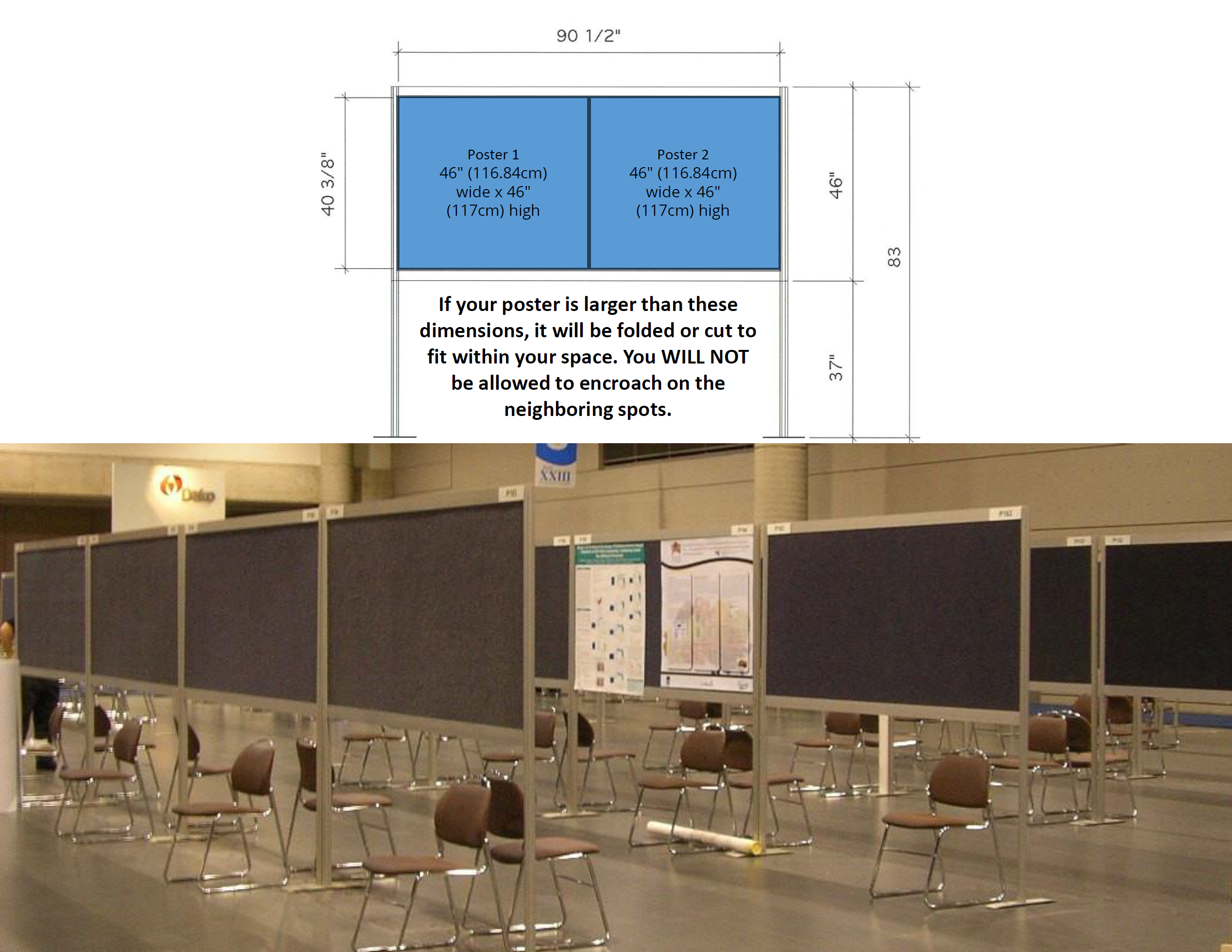
Click to enlarge
*No onsite poster printing is available*
Late-breaking Posters
After the initial submission deadline, late-breaking posters can be submitted. The submission window is notably smaller; be sure not to miss deadlines posted in the deadlines section or key dates page, as extensions cannot be granted.
Institutional Research
Not-for-profit research institutes and universities are able to submit their research findings as part of the call for posters. This will be displayed within the topic area of Institutional Research.
Reviews of Fields or Techniques
Individuals may choose to submit a poster presenting a review of a specific field or technique. These submissions do not need to contain original work from the author and are intended to be an introduction for individuals not familiar with the field or technique. These reviews are not meant to be advertisements (e.g. it is not acceptable that the poster is an advertisement for a book or other type of commercial publication).
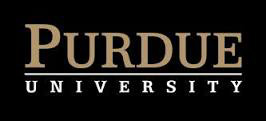
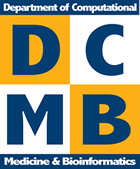

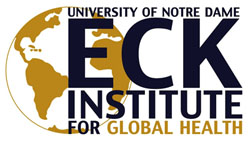

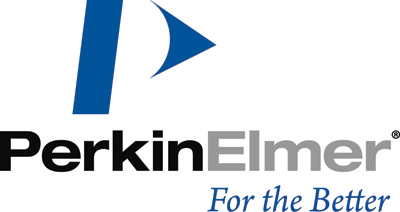
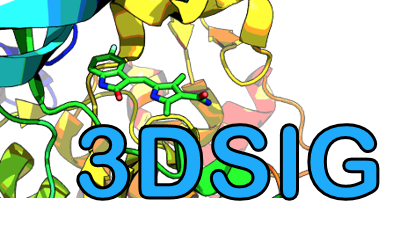 It is impossible to fully understand biological systems without understanding the 3D structure of their constituting parts and their interactions. As such the topics relevant for 3DSIG are wide and include, but are not restricted to Structure-based drug discovery including polypharmacology and network pharmacology; Structure representation, classification and prediction;
It is impossible to fully understand biological systems without understanding the 3D structure of their constituting parts and their interactions. As such the topics relevant for 3DSIG are wide and include, but are not restricted to Structure-based drug discovery including polypharmacology and network pharmacology; Structure representation, classification and prediction;
 Bioinfo-core is a worldwide body of people that manage or staff bioinformatics cores within organizations of all types including academia, academic medical centers, medical schools, biotechs and pharmas.
Bioinfo-core is a worldwide body of people that manage or staff bioinformatics cores within organizations of all types including academia, academic medical centers, medical schools, biotechs and pharmas.
 The BioVis track aims to educate, inspire, and engage bioinformatics and biology researchers in state-of-the-art visualization research and visualization researchers in problems in biological data visualization.
The BioVis track aims to educate, inspire, and engage bioinformatics and biology researchers in state-of-the-art visualization research and visualization researchers in problems in biological data visualization.
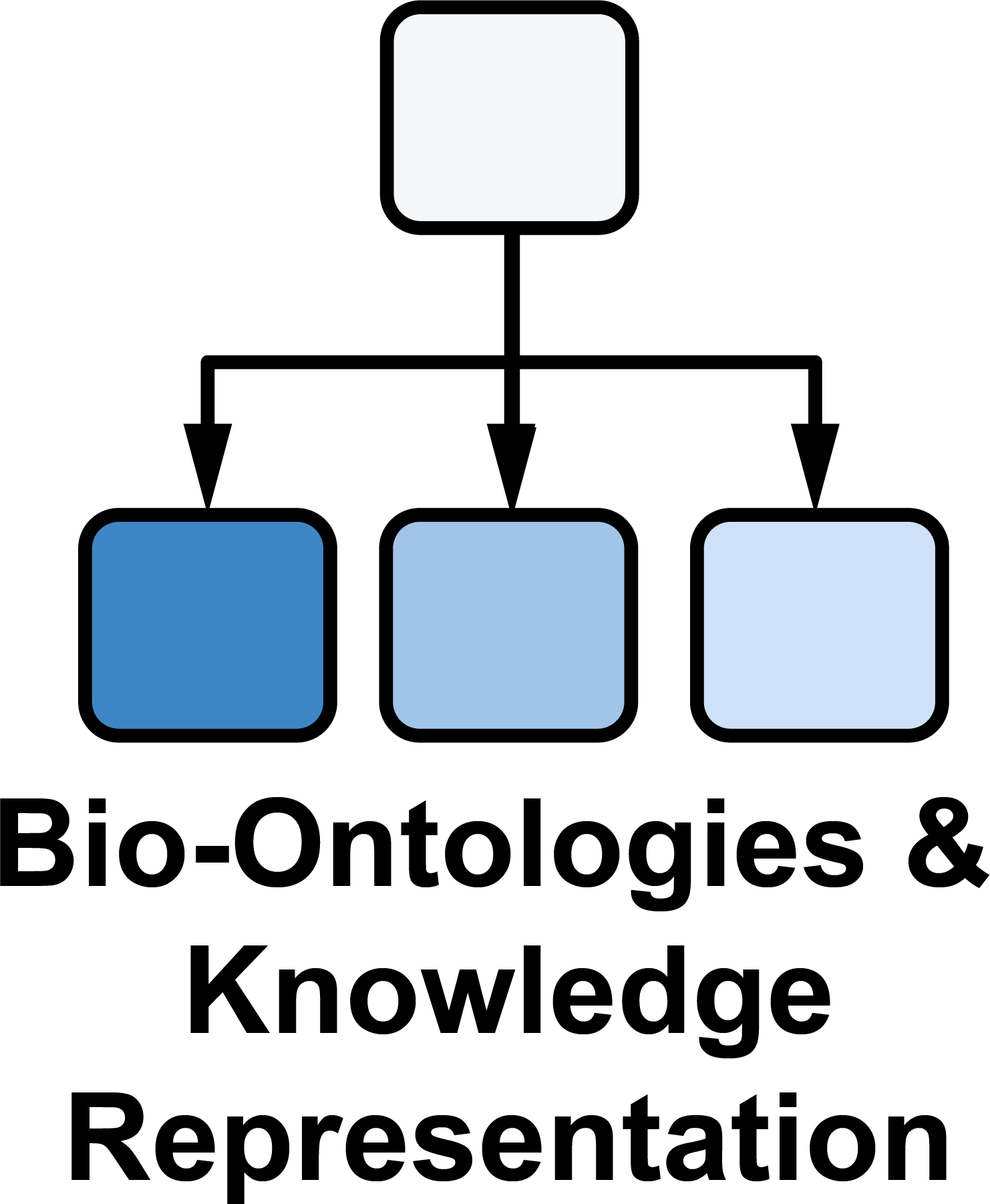 Bio-Ontologies & Knowledge Representation (BOKR) covers research related to building and using structured knowledge in bioinformatics, including ontologies, knowledge graphs, knowledge-enhanced learning, knowledge extraction, and, in general, any aspect related to the organisation, presentation, dissemination, and use of knowledge in biology, biomedicine, and the life sciences.
Bio-Ontologies & Knowledge Representation (BOKR) covers research related to building and using structured knowledge in bioinformatics, including ontologies, knowledge graphs, knowledge-enhanced learning, knowledge extraction, and, in general, any aspect related to the organisation, presentation, dissemination, and use of knowledge in biology, biomedicine, and the life sciences.
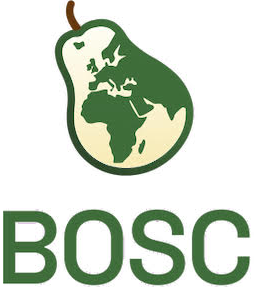 BOSC covers all aspects of open science / open source bioinformatics, including standards and ontologies; approaches that promote open science and sharing of data, results and software; bioinformatics tools and libraries; and ways to grow open source communities while promoting diversity within them.
BOSC covers all aspects of open science / open source bioinformatics, including standards and ontologies; approaches that promote open science and sharing of data, results and software; bioinformatics tools and libraries; and ways to grow open source communities while promoting diversity within them.
 The large, complex data sets for the Critical Assessment of Massive Data Analysis (CAMDA) contest include built-in truths for calibration. In an open-ended competition, however, both seasoned researchers and cunning students push the boundaries of our field, with unexpected questions or angles of approach often bringing the most impressive advances.
The large, complex data sets for the Critical Assessment of Massive Data Analysis (CAMDA) contest include built-in truths for calibration. In an open-ended competition, however, both seasoned researchers and cunning students push the boundaries of our field, with unexpected questions or angles of approach often bringing the most impressive advances.
 The CompMS group promotes the efficient, high quality analysis of mass spectrometry data. The CompMS initiative covers various computational mass spectrometry application domains, including proteomics, metabolomics, and lipidomics.
The CompMS group promotes the efficient, high quality analysis of mass spectrometry data. The CompMS initiative covers various computational mass spectrometry application domains, including proteomics, metabolomics, and lipidomics.
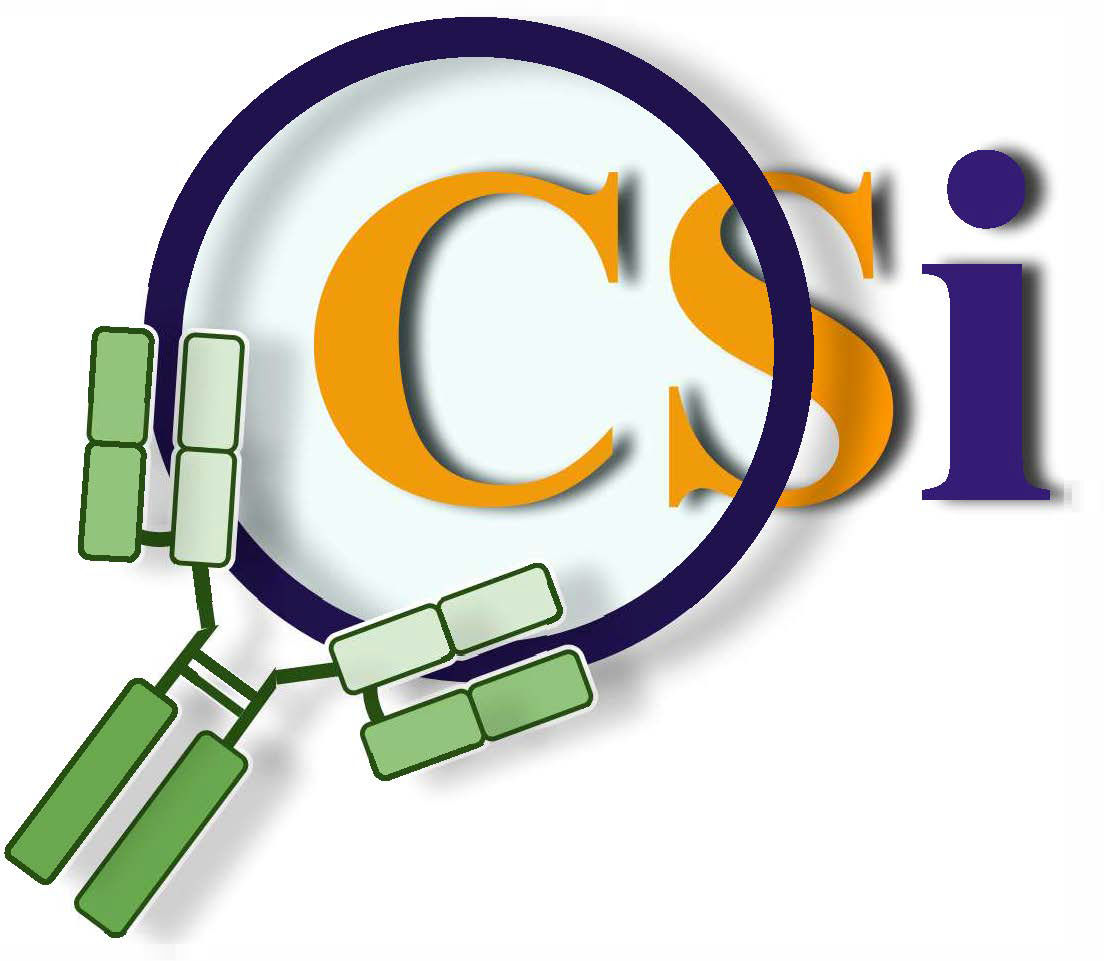 The Special Session on Computational Immunology invites abstract submissions for short talks and poster presentations encompassing various aspects of computational immunology. This includes the development of machine learning, network systems and immunogenomic approaches for analyzing multi-dimensional/multi-omic data.
The Special Session on Computational Immunology invites abstract submissions for short talks and poster presentations encompassing various aspects of computational immunology. This includes the development of machine learning, network systems and immunogenomic approaches for analyzing multi-dimensional/multi-omic data.
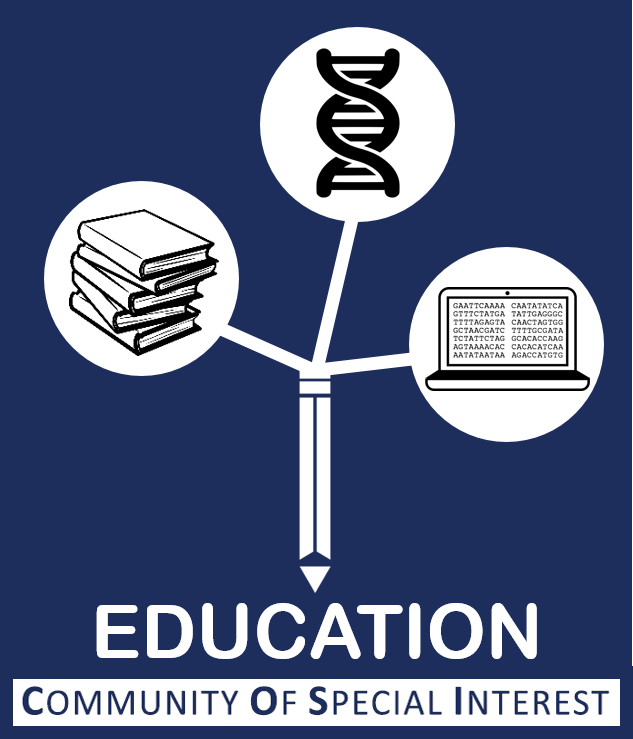 Education-COSI focuses on bioinformatics and computational biology education and training across the life sciences.
Education-COSI focuses on bioinformatics and computational biology education and training across the life sciences.
 Evolution and comparative genomics are deeply intertwined with computational biology. Computational evolutionary methods, such as phylogenetic inference methods or multiple sequence alignment are widely used, yet remain far from “solved” and are indeed intense areas of research.
Evolution and comparative genomics are deeply intertwined with computational biology. Computational evolutionary methods, such as phylogenetic inference methods or multiple sequence alignment are widely used, yet remain far from “solved” and are indeed intense areas of research.
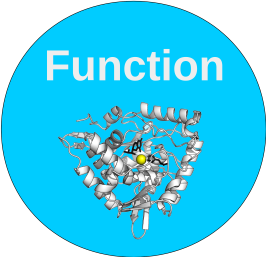 The mission of the Function Community of Special Interest (Function-COSI) is to bring together computational biologists, experimental biologists, biocurators, and others who are dealing with the important problem of gene and gene product function prediction, to share ideas and create collaborations.
The mission of the Function Community of Special Interest (Function-COSI) is to bring together computational biologists, experimental biologists, biocurators, and others who are dealing with the important problem of gene and gene product function prediction, to share ideas and create collaborations.
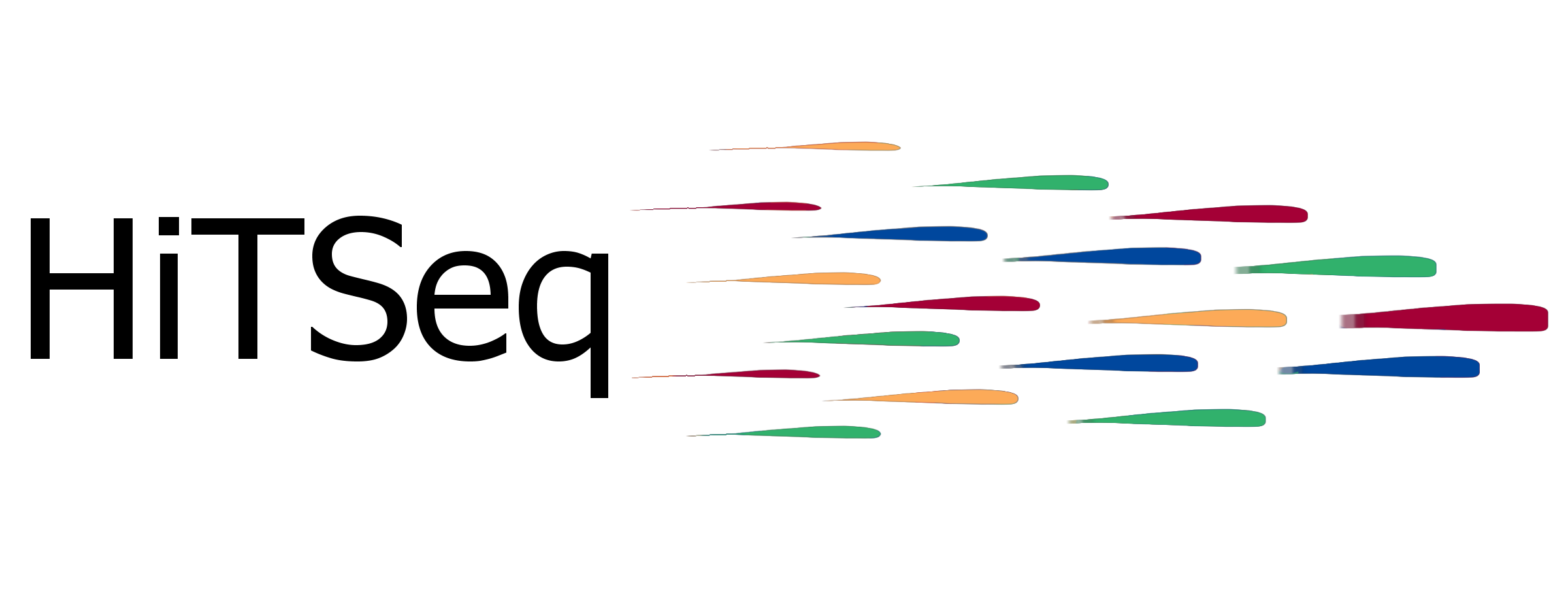 HiTSeq is a community of special interest devoted to the latest advances in computational techniques for the analysis of high-throughput sequencing (HTS) data. Sessions will be devoted to discussing the latest advances in computational techniques for the analysis of high-throughput sequencing (HTS) datasets and will provide a forum for in-depth presentations of the methods and discussions among the academic and industry scientists working in this field.
HiTSeq is a community of special interest devoted to the latest advances in computational techniques for the analysis of high-throughput sequencing (HTS) data. Sessions will be devoted to discussing the latest advances in computational techniques for the analysis of high-throughput sequencing (HTS) datasets and will provide a forum for in-depth presentations of the methods and discussions among the academic and industry scientists working in this field.
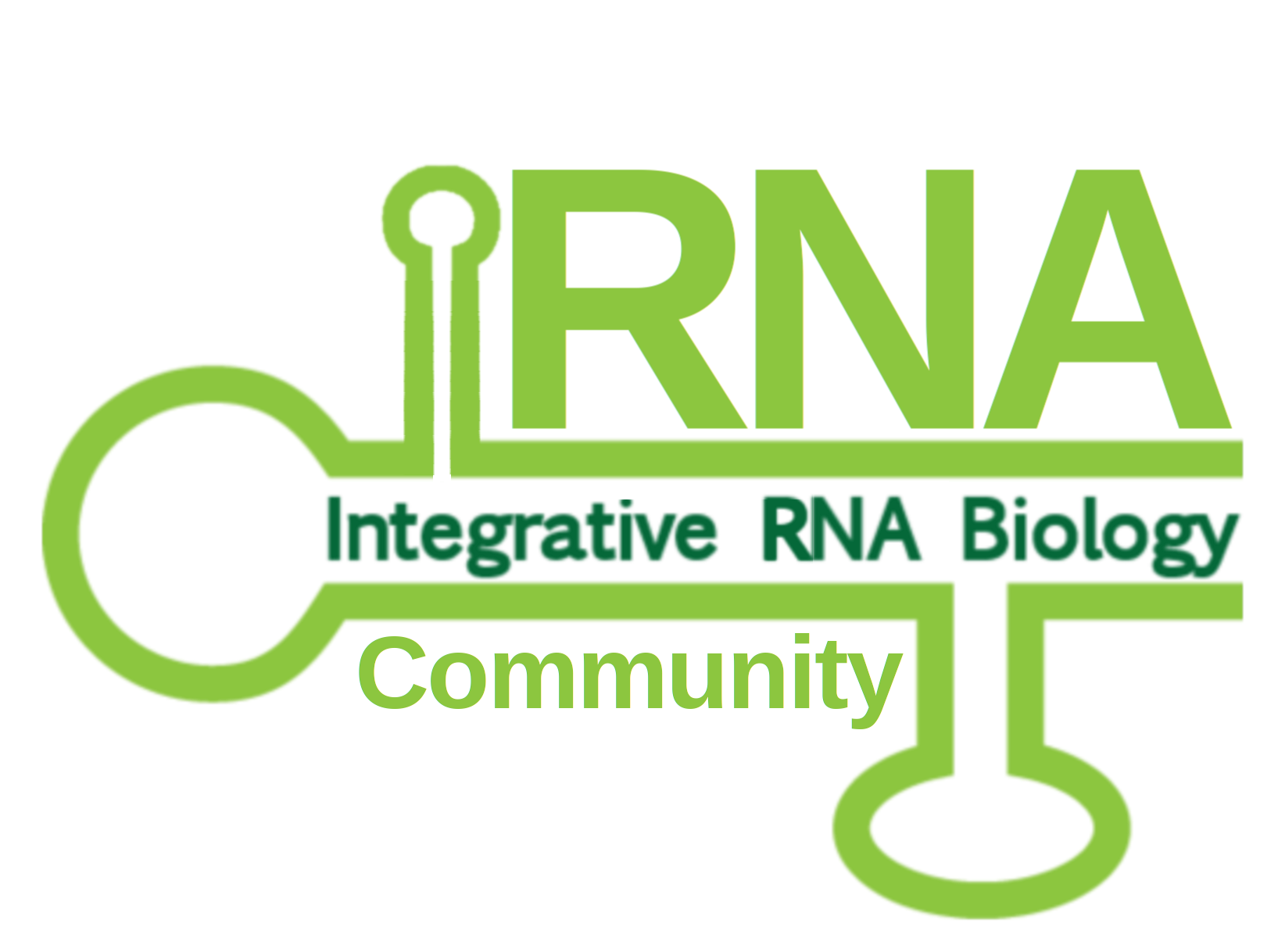 iRNA track covers the full range of research topics in the field of RNA Biology, from computational and high-throughput experimental methods development to their application in different aspects of RNA processing, structure, and function.
iRNA track covers the full range of research topics in the field of RNA Biology, from computational and high-throughput experimental methods development to their application in different aspects of RNA processing, structure, and function.
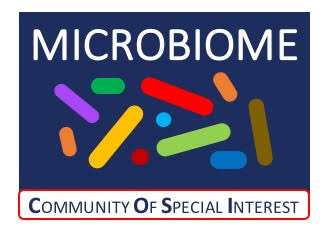 The MICROBIOME Community of Special Interest aims at the advancement and evaluation of computational methods in microbiome research, especially metaomic approaches. Based on the Critical Assessment of Metagenome Interpretation (CAMI), the COSI supplies users and developers with exhaustive quantitative data about the performance of methods in relevant scenarios.
The MICROBIOME Community of Special Interest aims at the advancement and evaluation of computational methods in microbiome research, especially metaomic approaches. Based on the Critical Assessment of Metagenome Interpretation (CAMI), the COSI supplies users and developers with exhaustive quantitative data about the performance of methods in relevant scenarios.
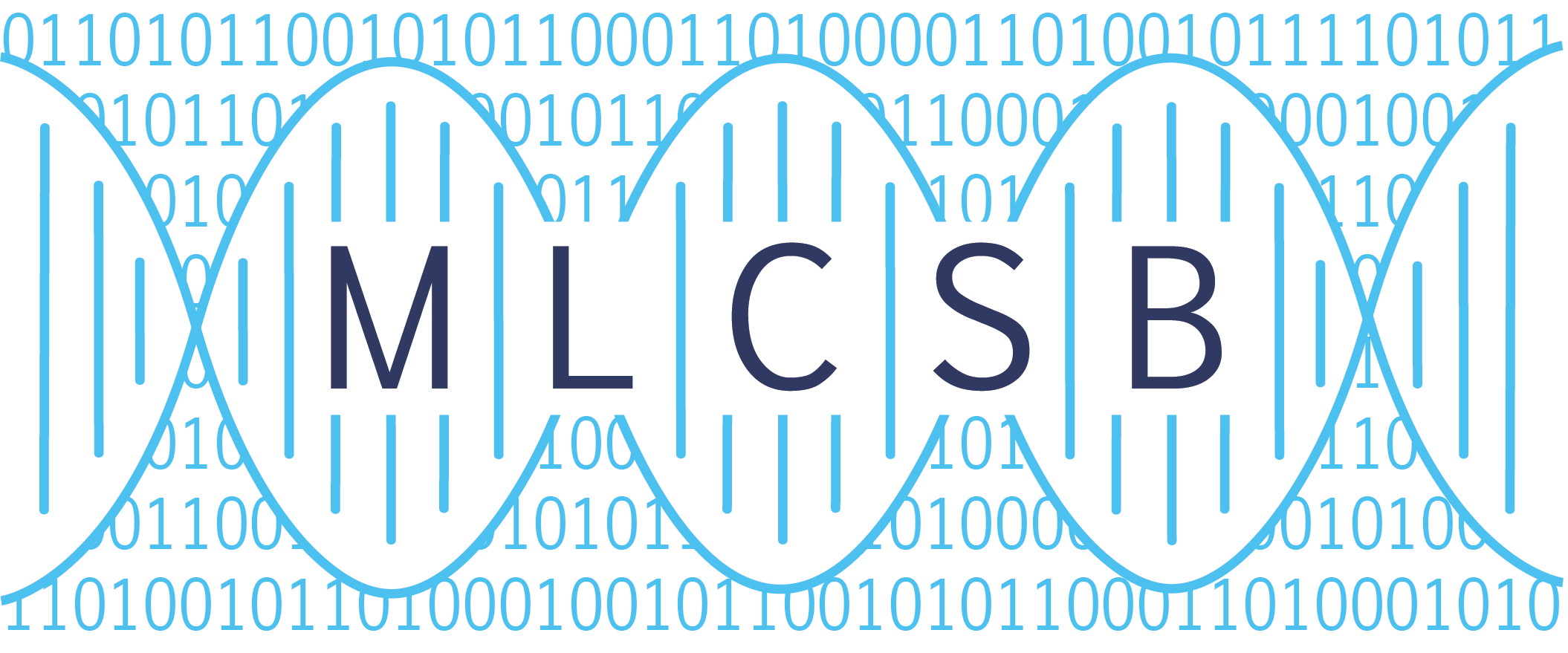 Systems Biology and Machine Learning meet in the MLCSB COSI. The community is the place for researchers of these areas to exchange ideas, interact and collaborate.
Systems Biology and Machine Learning meet in the MLCSB COSI. The community is the place for researchers of these areas to exchange ideas, interact and collaborate.
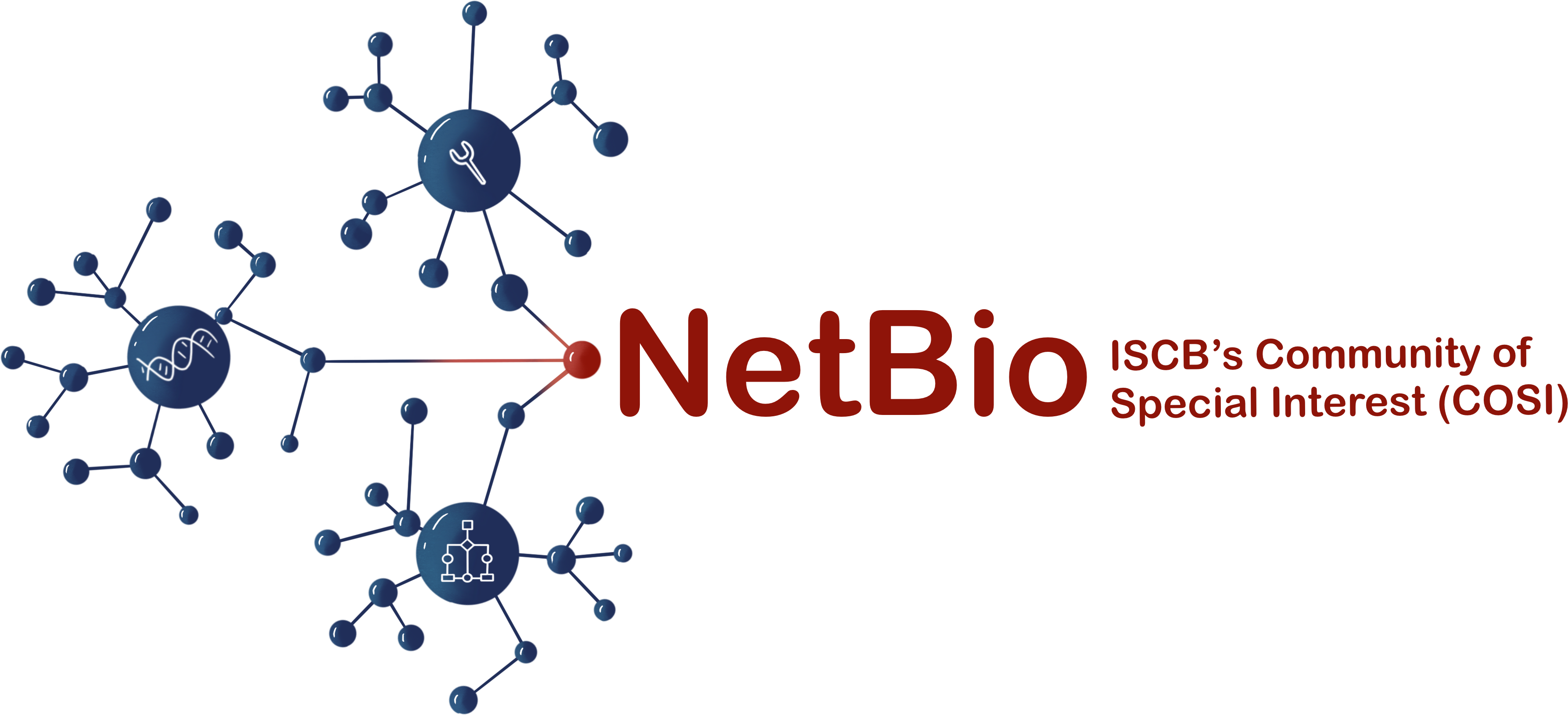 As large scale, systems-level data are becoming increasingly available, modeling and analyzing them as networks is widespread. Network Biology Community serves to introduce novel methods and tools, identify best practices and highlight the latest research in the growing and interdisciplinary field of network biology.
As large scale, systems-level data are becoming increasingly available, modeling and analyzing them as networks is widespread. Network Biology Community serves to introduce novel methods and tools, identify best practices and highlight the latest research in the growing and interdisciplinary field of network biology.
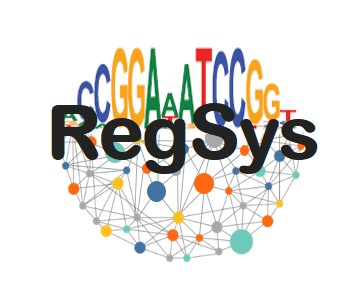 Regulatory genomics involves the study of the genomic control system, which determines how, when and where to activate the blueprint encoded in the genome. Regulatory genomics is the topic of much research activity worldwide. Since computational methods are important in the study of gene regulation, the RegSys COSI meeting focuses on bioinformatics for regulatory genomics.
Regulatory genomics involves the study of the genomic control system, which determines how, when and where to activate the blueprint encoded in the genome. Regulatory genomics is the topic of much research activity worldwide. Since computational methods are important in the study of gene regulation, the RegSys COSI meeting focuses on bioinformatics for regulatory genomics.
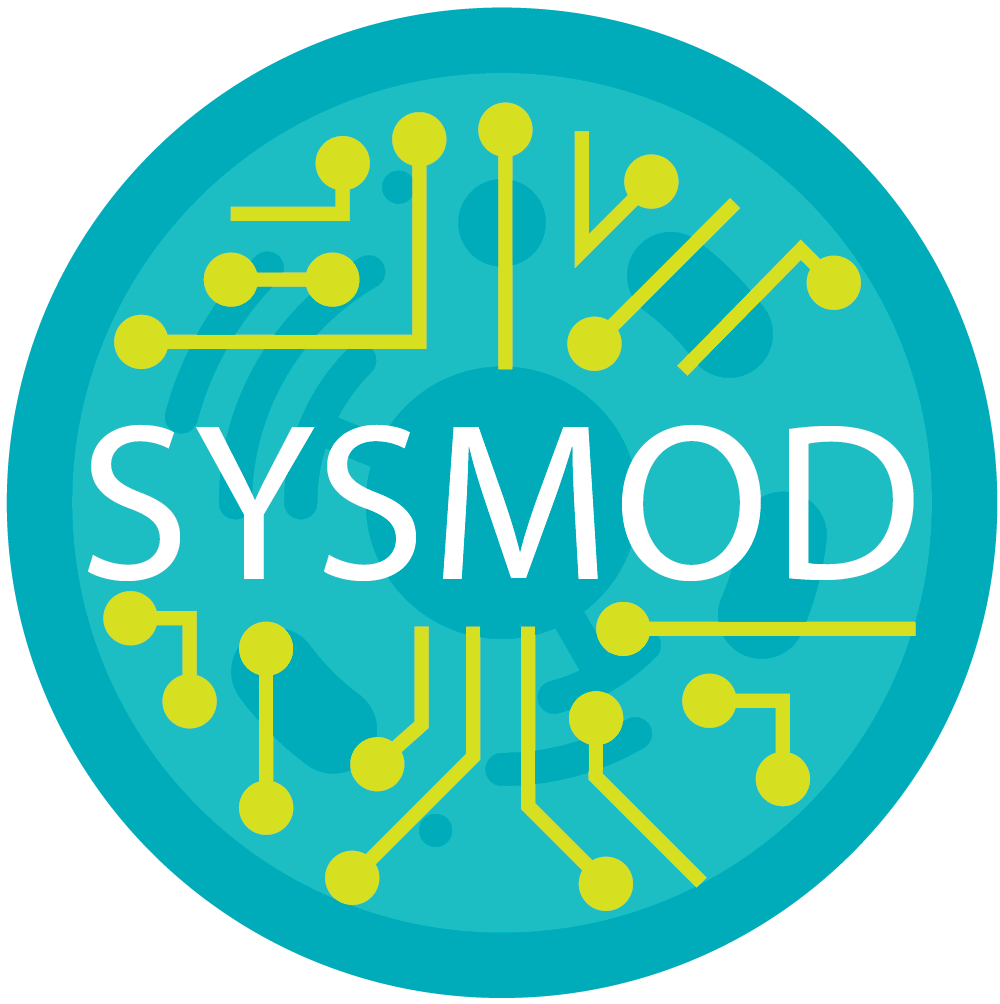 The Computational Modeling of Biological Systems (SysMod) aims to create a forum for systems modelers and bioinformaticians to discuss common research questions and methods. The session will focus on the conjoint use of mathematical modeling and bioinformatics to understand biological systems functions and dysfunctions.
The Computational Modeling of Biological Systems (SysMod) aims to create a forum for systems modelers and bioinformaticians to discuss common research questions and methods. The session will focus on the conjoint use of mathematical modeling and bioinformatics to understand biological systems functions and dysfunctions.
 The Text Mining COSI brings together researchers that create text mining tools with researchers who use text mining tools to make new discoveries. Our community discussions include both text mining use cases - concrete problems and applications in the biological/biomedical domain - and methodology development.
The Text Mining COSI brings together researchers that create text mining tools with researchers who use text mining tools to make new discoveries. Our community discussions include both text mining use cases - concrete problems and applications in the biological/biomedical domain - and methodology development.
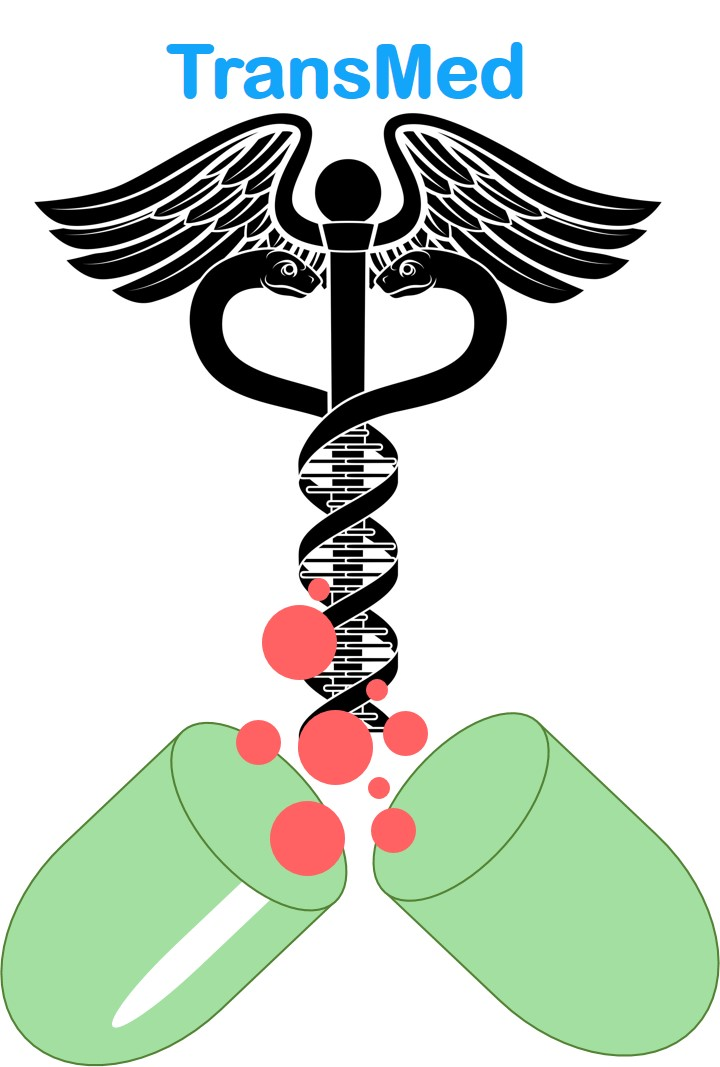 TransMed covers the current developments in the field of clinical and translational medicine informatics. Analysis of large amounts of multi-omics, imaging (medical and molecular), mobile sensor, clinical and health records data is paving the way for precision medicine. In the TransMed track, we will explore the current status of computational biology and advance machine learning approaches within the field of clinical and translational medicine.
TransMed covers the current developments in the field of clinical and translational medicine informatics. Analysis of large amounts of multi-omics, imaging (medical and molecular), mobile sensor, clinical and health records data is paving the way for precision medicine. In the TransMed track, we will explore the current status of computational biology and advance machine learning approaches within the field of clinical and translational medicine.
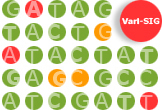 The VarI COSI meeting is dedicated to the recent advances in the analysis and interpretation of the genetic variants.
The VarI COSI meeting is dedicated to the recent advances in the analysis and interpretation of the genetic variants.